Geen onderdeel van een categorie
By Richard Whitehead, Director, Davis UK & Ireland
Davis UK & Ireland has recently launched NeuroNavigators, an online community designed to support parents, educators, professionals, and neurodivergent individuals at the very beginning of their journey.
Many families discover Davis during a moment of struggle. NeuroNavigators aims to meet them earlier — at the stage of curiosity — providing accessible education and strengths-based understanding before they step into a one-to-one programme.
The community offers free webinars on dyslexia, ADHD, autism, and related learning differences; interviews with Facilitators and programme graduates; practical guidance for parents; and a welcoming discussion space. It serves as a bridge into deeper engagement with Davis programmes and Facilitator training.
In collaboration with The Whole Dyslexic Society (WDS) in Canada, NeuroNavigators is also hosting screenings of WDS’s award-winning new film, Who Knew — Dyslexia is a Way of Thinking, helping to widen public understanding of dyslexia as a different way of thinking.
While open internationally, NeuroNavigators is particularly focused on supporting families and professionals across the UK & Ireland and in emerging Davis regions in Africa and the Middle East. Anyone interested can join the community for free at www.neuro-navigators.net
Read our latest posts:
- Davis UKIE: NeuroNavigators: Building Early Engagement with Davis
- Davis UKIE: Exploring a New Understanding of Neurodiversity at IE University
- Adult Dyslexia: The Workplace Advantage You’re Not Using
- Davis North America: Davis Facilitator Screens “Who Knew” Documentary for Lewis County Healthcare Professionals
- Meltdowns vs. Tantrums
Dolores Gage was recently invited to deliver an online talk for IE University faculty, reaching professors based in Spain and across IE’s international campuses, including New York. The invitation was circulated to approximately 1,000 faculty members worldwide, with strong engagement for a faculty development session: close to 50 registrations and nearly 40 participants attending live at the start of the session.
The session offered faculty a clear, integrated framework for understanding neurodiversity, focusing on dyslexia, ADHD, and autism. Rather than treating labels in isolation, it highlighted the shared cognitive dynamics behind neurodivergent thinking and learning, as well as their distinct expressions. Faculty were encouraged to reflect on their own teaching and consider small, practical adjustments—like clearer structure and flexible ways to demonstrate learning—that reduce barriers and enhance inclusion.
Feedback was overwhelmingly positive, with participants calling the session “immensely insightful,” “really useful and illuminating,” and “a new perspective that sparked curiosity.” Many planned to apply the ideas immediately, while many expressed how valuable it was to gain a clearer conceptual understanding rather than just additional tools.
The session reinforced the growing interest in higher education for approaches that move beyond deficit models, supporting both student wellbeing and academic potential.
Read our latest posts:
- Davis UKIE: NeuroNavigators: Building Early Engagement with Davis
- Davis UKIE: Exploring a New Understanding of Neurodiversity at IE University
- Adult Dyslexia: The Workplace Advantage You’re Not Using
- Davis North America: Davis Facilitator Screens “Who Knew” Documentary for Lewis County Healthcare Professionals
- Meltdowns vs. Tantrums
If you’re an adult who struggles with reading, writing, or spelling, you may have dyslexia — and you’re far from alone. Around 10-15% of the population has dyslexia. Many adults reach midlife without ever getting a diagnosis, quietly compensating for difficulties they don’t fully understand.
That changes when you know what you’re working with.
What adult dyslexia actually looks like
Dyslexia isn’t just about reversing letters. As an adult, your experience might look like this:
- You’ve gravitated toward roles that play to your strengths and avoid your weak spots
- You hide difficulties from colleagues, friends, or family
- You struggle with standardised tests, which can block career advancement
- You’re either a high achiever or someone others say isn’t “working to potential” — rarely in between
- You’re highly intuitive, read people well, and think in ways others don’t
- You struggle to remember names but never forget a face
- Verbal instructions don’t stick; you need to see things to process them
- You re-read the same paragraph multiple times, or fatigue quickly when reading
- Your spelling is inconsistent — sometimes within the same document
- You rely on spell-check, assistants, or others for written work
These aren’t character flaws or laziness. They’re patterns that point to a different kind of brain — one with real strengths that conventional workplaces often overlook.
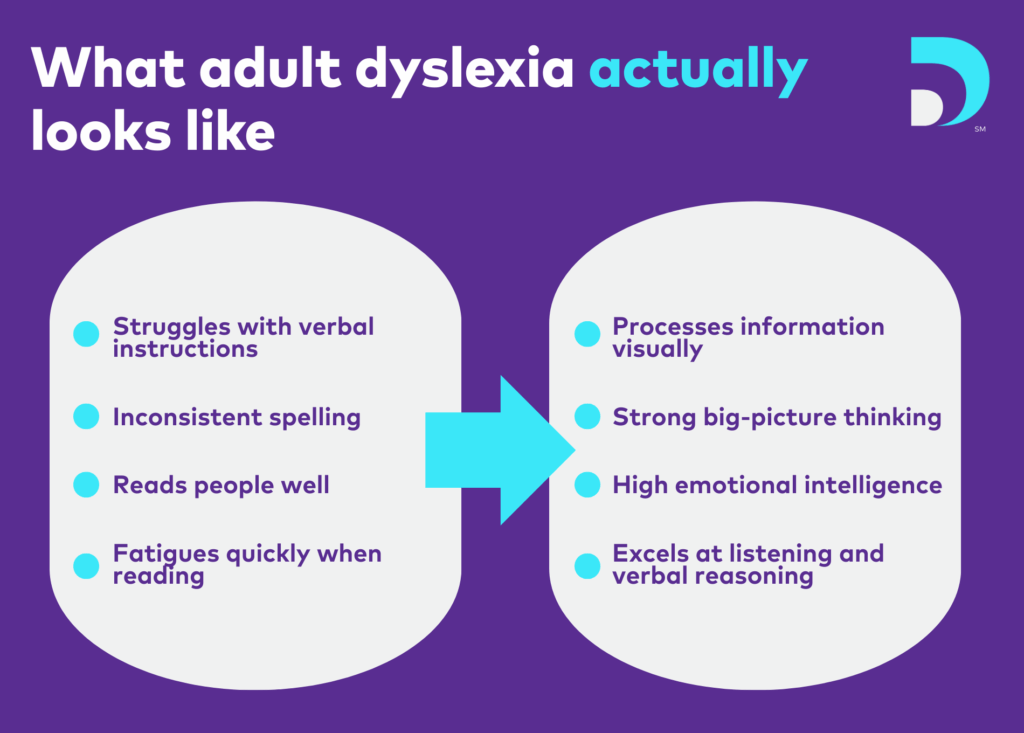
The thinking style behind the struggles
Dyslexic adults tend to be strong visual and spatial thinkers. You process information in pictures rather than words, which makes you better at seeing the big picture, connecting ideas, and solving problems creatively. These are the skills that drive innovation.
It’s no coincidence that people like Jamie Oliver, Richard Branson, Steven Spielberg, Keira Knightley, Zoe Saldaña, and Octavia Spencer have dyslexia. Branson has said his dyslexia gave him the ability to see the big picture in business — and in 2024 he launched a free learning platform, the University of Dyslexic Thinking, specifically to help others use those same strengths. Spielberg wasn’t diagnosed until his 60s; he described the discovery as “the last puzzle piece to a great mystery.” These aren’t people who succeeded despite dyslexia. Many credit it directly.
Why stigma still holds adults back
For younger generations, the conversation around dyslexia has shifted significantly. It’s increasingly framed as a different thinking style, not a deficit. But for many adults — especially those who struggled through school before dyslexia was well understood — the stigma runs deep. Low self-esteem, a fear of being “found out,” and years of compensating in silence are common.
That wasted potential isn’t inevitable. It’s the result of not having the right tools or support at the right time.
What you can do about it
The Davis Method was developed by Ron Davis, an adult with dyslexia who found his own way through. The program works with your natural perceptual strengths rather than against them. It’s an intensive one-on-one programme — typically around 30 hours over one week — and follow-up work is done independently, at home, at no extra cost.
The Davis Method is effective for dyslexia and also for related learning differences including ADD/ADHD, dyspraxia, dyscalculia, and dysgraphia. It’s currently available in 38 countries and can be used in virtually any language.
If you’ve spent years managing around your difficulties rather than addressing them, this is a practical option worth knowing about.
Have questions about the Davis Mastery for Dyslexia Program? Contact us
Press release: January 30, 2026
Tuesday, January 26, 2026 – It was clear and cold as Lindsay Hodge, Davis Method Facilitator in Southwest Washington, packed her kids into the car and headed to her office with two of her colleagues in tow. Jeanette Devries and Mirriam Hill, facilitators from BC, drove down to help support Hodge at a lunch time community outreach event she had set up. The goal: to spread the word about the Davis Methods and the new documentary, “Who Knew: Dyslexia is a Way of Thinking” with certain members of the community. The highly acclaimed documentary, created in partnership with The Whole Dyslexic Society and Nice Lady Productions, and funded by TELUS Story Hive, has now won several awards at various film festivals.
Watch the trailer for Who Knew here.
View Lindsay’s profile here.
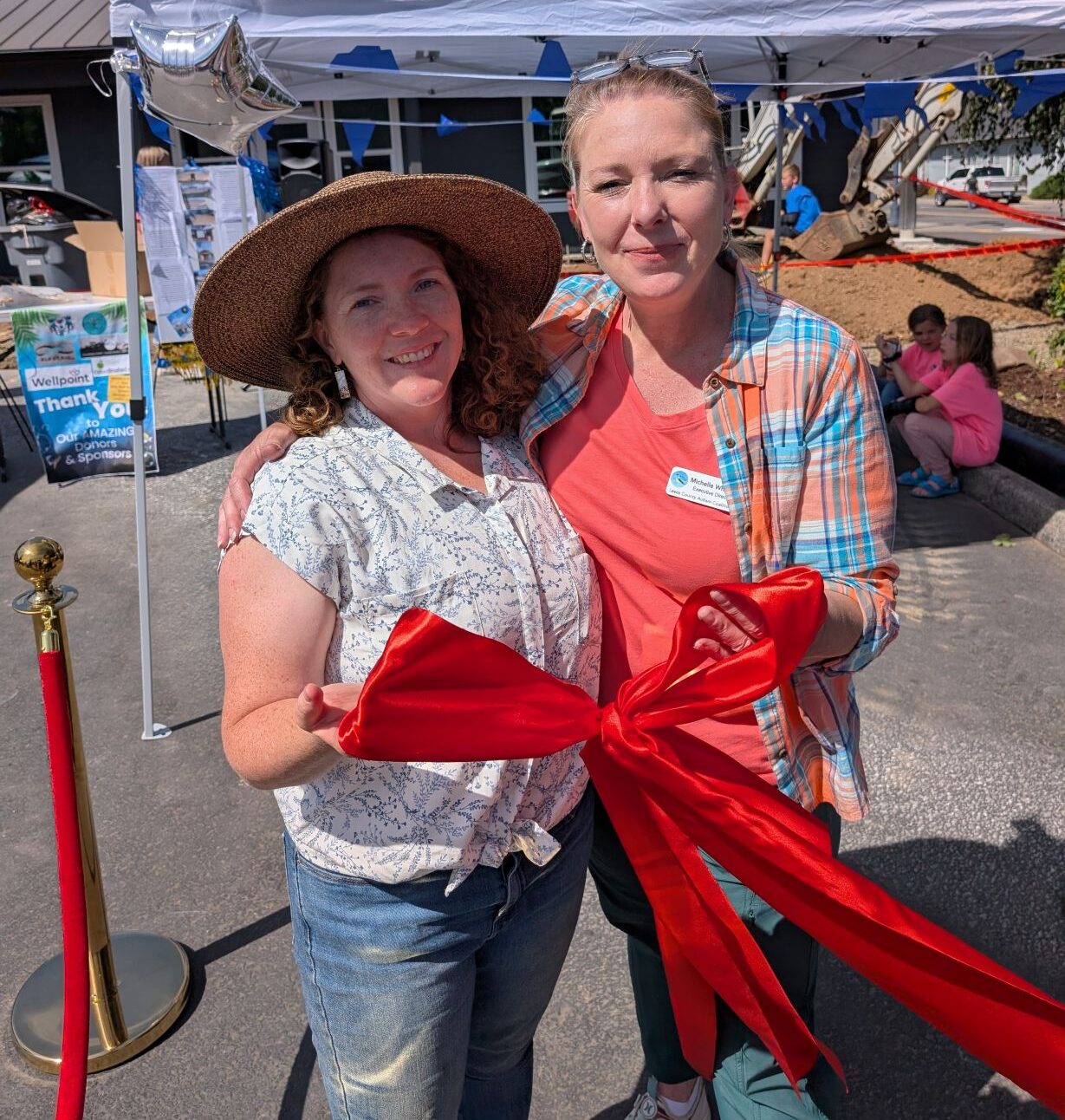
This event had been in the works for a few months. Last year, Hodge initiated a relationship with the Lewis County Autism Coalition (LCAC). By September 2025, she had moved in as an independent service provider to the LCAC’s new community space, The Spectrum and Development Community Center in Napavine, Washington, USA. The Community Center was created with the intention of making resources and services more accessible to families and individuals in need. As neighbors, the Lewis County Pediatrics and Family Medicine Clinic and LCAC intend to work hand in hand to support neurodivergent individuals and their families. Hodge faced only one issue: no one really knew about Davis Method Solutions.
Hodge says, “When I say that I provide Davis Method Programs for Dyslexia, ADHD and students who struggle with Math, the follow up question is always, ‘What is a Davis Method Program?’ I’m so grateful for the hard work that went into that documentary. That was the most wonderful way to introduce what I do to the clinic professionals and LCAC board members.”
Hodge had invited clinic professionals, LCAC board members, and other professionals who were interested in knowing more about the Davis Method, including one representative from an organization called Morningside, which works with disabled persons who need help finding gainful employment. She also invited Davis colleagues from her region, and a few parents of former clients. There were 18 individuals in attendance at the private screening event. Hill and Devries were invaluable support to Hodge in preparing for the event, helping Lindsay to pick up food and conversing with Hodge’s children. In addition to being a licensed Davis Facilitator, Hodge is a homeschool mom of three children, aged 15, 13, and 6 years old. Her children are the reason she came to Davis, and it was a gift to have them in attendance as well.
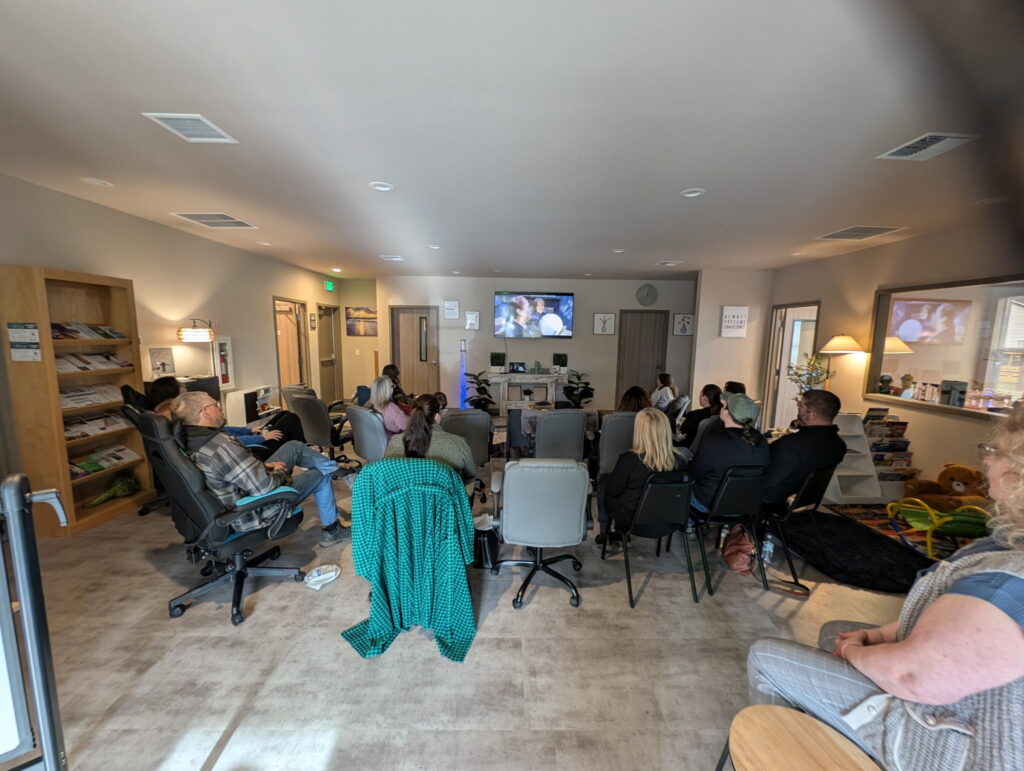
At noon, community members began coming in. They were greeted, asked to sign in, and invited to grab some lunch while they waited to get started. At 12:15, Hodge stood up and introduced the documentary and invited guests to take notes in preparation for the brief Q&A afterward. Then the lights were turned down, and they watched the beautifully made documentary. The audible gasps and “Ohs!” that were heard during the screening were a sign that the audience was engaged. When the lights came up, Hodge’s youngest son jumped up and exclaimed, “MY MOM IS THE BEST!” and everyone shared a little chuckle.
Then came the questions. One guest raised his hand and asked, “How long has this been around?” He shared that he was dyslexic, and that he related on a deep level with Davey, the father of Wynn. “That was me,” he said. Hodge answered with a brief overview of how these methods came to be, and anticipated that the next question would be “Why doesn’t everyone know about this?” She shared a bit about new rebranding and restructuring of the Davis organization, and the hope that they would be better able to help spread the word. She also shared about efforts of Davis facilitators worldwide to get the word out, including the work the Whole Dyslexic Society is doing with the documentary and other outreach. Other participants asked how they could share this information, and providers at the clinic asked how they could refer patients to Hodge or other facilitators. Hodge pointed them to the Davis Method Website for more information on Davis programs, and the Whole Dyslexic Society site for more information on when the documentary will be made public. A few participants even asked about the possibility of becoming facilitators themselves.
There were questions about the structure of Davis method programs, costs, and questions about the effectiveness of the programs. Hodge shared brief overviews, and invited participants to learn more at the Davis Method website or call her directly. It was a powerful moment for those in attendance when David Kerman, father of a former client, spoke up and shared his experience. “We struggled to find help for our daughter in the public school where we lived in Oklahoma… in fact her reading got worse. Then we moved here and started working with Lindsay. Our daughter went from basically not reading at all, to being able to read, and now she is even writing her own stories,” said Kerman. “We attribute all her current success to the work that Lindsay did with our daughter and the Davis Methods.”
As the event wrapped up, guests grabbed stacks of brochures and business cards. Some asked Hodge to contact them directly. Devries leaned in and whispered to Hodge, “You have certainly broadened your reach here today.” Hodge smiled and said, “I sure hope so.” The clear result of the event was that at least a few more people know that Dyslexia is a way of thinking, not a fundamental disability within an individual’s brain, and that there is a way to help those who are struggling as a result of not being taught in the way their brains were born to learn.
Davis facilitators offer one-on-one programs for dyslexia, ADHD, autism, and math learning differences. Programs are personalized to each client and based on the Davis Method developed by Ron Davis.
Find a licensed Davis facilitator near you.
By Dr. Angie Gonzalez, Licensed Davis Autism Approach and Concepts for Life Facilitator / Workshop Presenter
Note: This article was originally published on the Ron Davis Autism Foundation website. We’re sharing it here for our community.
When I present a workshop on Autism and I ask the parents in the room, “Is there a difference between a meltdown and a tantrum?”, the response of positive nods and “Oh yeah” is immediate. Others in the room appear to be a little more perplexed, wondering the relevance of the question.
Most of us have had personal experiences either observing or being at the “Oh my gosh! How do I control this?”, end of a tantrum. But, others have had the repetitive experiences of experiencing meltdowns, either within themselves or by others.
So, what is the difference? Why write about them? Aren’t they the same thing but just different names?
No. What they are and how we should handle them are completely different.
What is a Meltdown and what is a Tantrum?
To understand this, we need to understand a little (don’t worry, very little) about neurotypical childhood development.
In neurotypical childhood development, there are stages. The end of the first stage of development occurs in neurotypical children around the age of two. The end of this stage is ushered in by the onset of individuation (a fancy word meaning the realization that we are separate, individual units from all the things and people around us). With individuation, we realize that we have personal wants and don’t-wants, and we decide it’s time to let everyone around us know what those are. The behavior that arises from this realization has been termed the “Terrible Two’s.” This period is characterized by Tantrums. You know what those are – when a two-year-old wants candy at checkout and you say “No,” yelling, crying, dropping to the floor, turning red, holding their breath, etc. ensues. There is some level of conscious control that is occurring during a tantrum. If the behavior is reinforced, it will continue. If the behavior is disciplined, consistently (not just the one time, people!) it will cease.
A Meltdown is something totally different.
If I see a lizard in my office, I am going to scream (I know this to be true because it has happened more than once). If someone steps on your foot, you are going to pull it away. You will not think about it first, it is instinctual. I cannot tell you why I scream when I see a lizard in the office and not when I see them outside, but I do. The response is generated from somewhere other than my conscious self. It is again, instinctual. You cannot tell me enough times not to scream when I see it for me not to scream.
When someone is having a meltdown, we cannot talk them through it! You cannot rationalize someone out of a meltdown because it is generated from that visceral place of instinctual response. It also doesn’t matter whether you think whatever has ‘triggered’ the meltdown is a reasonable thing to have a meltdown about. You do not get to determine that unless you are the one having the meltdown. Meltdown triggers are specific to the individual. It could be the texture of the mac-and-cheese, the fact that someone is too close to them, the feeling of the tag from a shirt, the smell of the neighbor’s cat, the sound of the bubbling spaghetti sauce… the possibilities are endless. So, the question then is, “what do we do”?

How do we Handle a Meltdown vs. a Tantrum?
Simple.
Protect and support a MELTDOWN
Discipline a TANTRUM
What does that mean?
It means, that if your kiddo is having a meltdown, remove them from the stimulus, protect them from more triggers, make their surroundings physically and emotionally safe, and do what you know calms them. Most of all, regulate your own response. Stay cool and even-tempered in your actions and emotions. These individuals respond more to how you are ‘being’ than what you are saying or doing.
If your child or student is exhibiting behavior that you know precedes a meltdown, remove them from the stimulus, attempt to redirect their attention and give them whatever they use for self-soothing. Again, get yourself in order – stay cool and even-tempered.
In the future, avoid those things that trigger meltdowns. You know what they are – because all parents are the world’s greatest project managers.
If, on the other hand, your child is having a tantrum – this is the time to remain calm and firm. If you told them they can’t have the candy at the cash register, then please do not give in. Remain consistent and let them know that if they continue the negative behavior (say this in ‘little kid’ terms) then (fill in the blank) is going to happen. Then if they continue, the (fill in the blank) has got to happen.
The more steadfast you are in your consistent response to tantrums, the shorter the terrible two’s (or terrible fourteens) will be.
Hope this helps. Love you all.
Remember, keep it simple.
Dr. Angie
To find out more about Dr Angie and what she offers, you can go to her website: Dr Angie’s Place
Click here to find out more about the Davis Autism Approach.
Interested in the Davis Autism Approach but not sure where to start? Contact us for a free Discovery Call
When Ron Davis was a child in 1949, he sat in a corner of his classroom wearing a handkerchief on his head—a mark of shame. He couldn’t read. Teachers called him names. He had no idea that his “broken” brain would later unlock the very gift that was causing his suffering.
At 38, Davis made a discovery about his own perception that let him read a full book for the first time. He then spent decades developing techniques to help others harness the same mental abilities. The Gift of Dyslexia, first published in 1994, became a global bestseller because it offered a radical reframing: dyslexia isn’t a disability to overcome. It’s a talent that creates problems when it collides with written language.
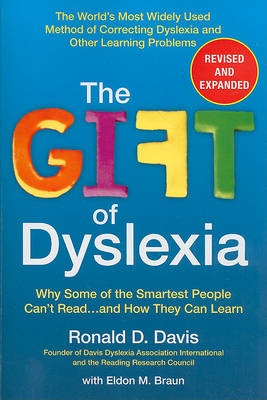
The Gift Inside the Problem
Here’s the point most people miss: the genius doesn’t happen in spite of dyslexia. It happens because of it.
All dyslexics share eight core abilities:
🟣 They can alter and create perceptions—the primary ability underlying everything else
🟣 They’re highly aware of their environment
🟣 They’re more curious than average
🟣 They think mainly in pictures, not words
🟣 They’re intuitive and insightful
🟣 They perceive multi-dimensionally, using all their senses
🟣 They experience thought as reality
🟣 They have vivid imaginations
Albert Einstein, Walt Disney, and Greg Louganis all had dyslexia. Their genius emerged from the exact same mental functions that made reading difficult. When these abilities go unvalidated or suppressed, dyslexics often hide their gifts and adopt workarounds. When they’re recognized and developed, they produce something Davis calls the gift of mastery—the ability to understand something so deeply, experientially, that you know how to do it intuitively.
Why Dyslexia Happens
Davis explains dyslexia as “the Mother of Learning Disabilities.” It shares a root cause with ADD/ADHD, autism, dyscalculia, dysgraphia, and hyperactivity. Each case is unique because dyslexia results from a combination of an underlying talent and environmental influences—particularly the stress and invalidation that happen during early school years.
Here’s how it works: dyslexic children are visual thinkers who excel at recognizing real objects. Their brains process multi-dimensional thinking faster than verbal thinking. But when they encounter printed symbols—letters and words—their talent becomes a liability. The symbols confuse them because the child’s brain tries to apply real-world visual perception to abstract marks on a page.
Disorientation triggers when confusion sets in. The stress of repeated failure compounds it. Over time, many dyslexics adopt mental tricks to hide their disability, damaging their self-esteem in the process.
The Path Forward: Three Proven Techniques
The revised and expanded edition of The Gift of Dyslexia includes updated methods for addressing the problem while preserving the gift. Davis details three concrete techniques:
Davis Orientation Counseling teaches dyslexics to turn off disorientation and refocus their perceptions. Two simple mental exercises allow them to overcome distorted perception and accurately recognize printed symbols.
Davis Symbol Mastery uses a stress-free, multi-sensory approach. Students model symbols and word concepts in clay—engaging their creativity while building accurate visual word recognition.
Davis Reading Exercises are three simple daily practices that improve reading fluency and comprehension.
The point isn’t to “fix” the dyslexic mind. It’s to teach dyslexics how their minds work and give them tools to use their talent without the distortion.
Who Needs This Book
If you’re a parent of a dyslexic child, you’ll find practical guidance and something more important: perspective. Your child isn’t broken. Their brain works the way Einstein’s did.
Teachers and facilitators gain insight into how dyslexic students actually think—not as a deficit model, but as a different processing style with real strengths.
Adults with dyslexia often report that this book validates their experience and explains struggles they never understood. Many discover they’ve been using the positive side of dyslexia in their work all along without realizing it.
And anyone who works with dyslexic individuals—whether as a supporter, educator, or therapist—benefits from Davis’ perspective. It shifts you from seeing a problem to seeing a talent that needs direction.
Get Started With Your Reading
Download: 5 Common Myths About Dyslexia — Before diving into the book, grab this free sheet. It clears up the misunderstandings that keep people stuck: dyslexia isn’t just about letter reversals, trying harder won’t fix it, and it’s not a lifelong disability to be managed. Understanding these myths shifts how you see dyslexia—and opens the door to seeing it as a gift.
Buy The Gift of Dyslexia Now — Available in paperback through dyslexia.com, or listen to the audiobook on Audible.
Want to sample it first? Read the book summary, preface, and first chapter at the shop.
Available in paperback through dyslexia.com, or listen to the audiobook on Audible.
Want to sample it first? Read the book summary, preface, and first chapter at the shop.
ISBN: 978-0399535666
Publisher: Perigee Books, 2010
Author: Ronald D. Davis with Eldon M. Braun
Contact us
By Matthew Head
Note: This article was originally published on the dyslexia.com website. We’re sharing it here for our community.
Taking the First Step
After reading the book The Gift of Dyslexia (see my review here), I felt the overwhelming need to get myself on a Davis® Mastery for Dyslexia program.
I looked up my local facilitator, Tessa Halliwell. I dropped her an email that morning to enquire about the program, and by that evening we had a short introductory Zoom call.
I remember feeling quite emotional after this as I had the very strong feeling that this program would really assist me in areas that I had believed could not be corrected but only mitigated.Note: This article was originally published on the Ron Davis Autism Foundation website. We’re sharing it here for our community.
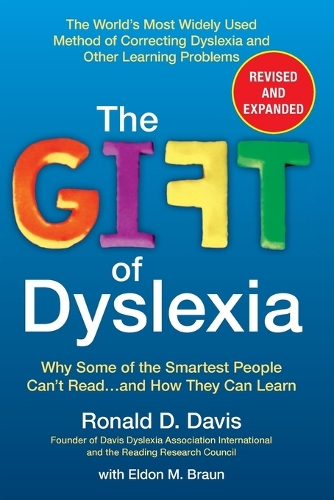
I think the feeling of mixed emotions was a combination of excitement to see where this process would take me, and the difficulty of letting go of a belief that my brain, although wonderful in some aspects, really couldn’t do some other things.
I have always believed that I have a lot of positive attributes to bring, quite a few of them shaped by my dyslexia. However, this is balanced by some weaker skills. All my life I’ve been unable to spell very well, having to use all sorts of tricks to get round this issue (dyslexialifehacks.com), but it always creeps through.
Going Online
Due to participating in this program in January 2021 when the UK was still under Covid-19 pandemic restrictions, the program was carried out in its entirety over Zoom (Video Calls). A little bit housekeeping from myself before starting was required: I made sure my Webcam was in good order and borrowed a set of laptop speakers, so I didn’t have to sit with a headset on for hours each day, and then I was good to go. To anybody reading this in the future – welcome to what life was like in 2020/2021! An initial concern for me was that doing the program over Zoom might be an issue; however, this was soon eliminated after my first initial assessment with Tessa.
The initial assessment is a simple exercise to check my perception ability also the added bonus of visualising a very nice chocolate orange cake, yummy! As it would have it, I have quite a strong perception ability, which allows me to be suitable for orientation counselling.
A note on this article: This outlines my experience of the program and touches on some of the techniques used. It is not to be taken as a guide to the techniques or how to use them. For this, I recommend reading the book The Gift of Dyslexia and/or booking yourself on a Davis® Mastery for Dyslexia program.

Getting Started With the Kit
With my kit in hand – plasticine (modelling clay), modelling tools, a workbook, the course manual, Koosh Balls, and a dictionary – I was ready to start. My conditioned brain had learned to shudder at the sight of the dictionary; however, during the program it would become a surprising ally.
Orientation: Taking Control of Your Mind’s Eye
The first day consists of carrying out the orientation procedure, so I have control of my mind’s eye. This enables me to better understand when I’m being disorientated. Because of the remote setting, this involved getting creative with blue tack and making sure my webcam was parked in the right place; after that, the procedure was straightforward. I admired Tessa’s ingenuity in getting round the video call limitations. While doing this course over Zoom I found it very useful to have a USB webcam rather than using a laptop’s integrated camera.

Alphabet Mastery
With this new tool in hand, it was now onto the alphabet. “ABCD EFG HIJK LMNOP…” is the song that sings in my head every time I must think of the order of letters. By the evening of 18 January 2021 that song was pretty much redundant!
The alphabet mastery programme consists of first modelling all the uppercase letters using plasticine in a type font set out by the programme. After an initial go at modelling the letters, it was clear that my alphabet needed work. My ABC was a nice, consistent size and it slowly grew. The first thing was to remodel all the letters so they were consistent size and height, then the fun part begins.
I then got “on point” and looked over all 26 letters. Then I was assessed on the alphabet layout. This involved picking letters at random and me trying to tell which letters went before and after it in the sequence. If there were troublesome letters, Tessa would go through a procedure with me to see if there was any kind of attachment to these letters that might be triggering my mind’s eye to move.
This is one of the driving principles of Davis® Mastery for Dyslexia: putting your mind’s eye on its orientation point so that external reality is the reality your eyes see, then developing an understanding of when it might have shifted off this point. This would happen to me when I was confronted by a trigger letter.
Throughout the afternoon the magic of this program really came to life. Once we had cleared the alphabet of any triggers and checked a few times that I had mastered it, it was done! No need to come back the next day or week and do it again and again. Mastering the alphabet isn’t tricky once the conditions are set correctly. I got to the point where I could be asked about any letter in the sequence and have no problem with it. This was repeated with the lowercase alphabet.
My brain now has clear pictures for both upper and lowercase alphabet. This also cleaned up some letter confusion, including flipping Bs and Ds round, or Ps and Qs. Post-program, although I never thought I had visual stress, letters of any type font or colour now stand out strongly and clearly to me.
Punctuation and Building Blocks
The same technique applied to punctuation. I thought I knew what punctuation meant, but now I know with certainty. I found an instant improvement in how I looked at punctuation on a page and my comfort with it, which then helps with reading and writing.
Tessa introduced various building blocks throughout the program to assist with the written word:
- Spell reading – uncovering a sentence or phrase letter by letter, saying it out loud and seeing if I then understand the word
- Sweep, sweep, spell – sweeping over a word twice before spelling it
- Picture at punctuation – stopping at each punctuation point and describing the image that the previous section created in my mind, then discussing and comparing it to what is written down
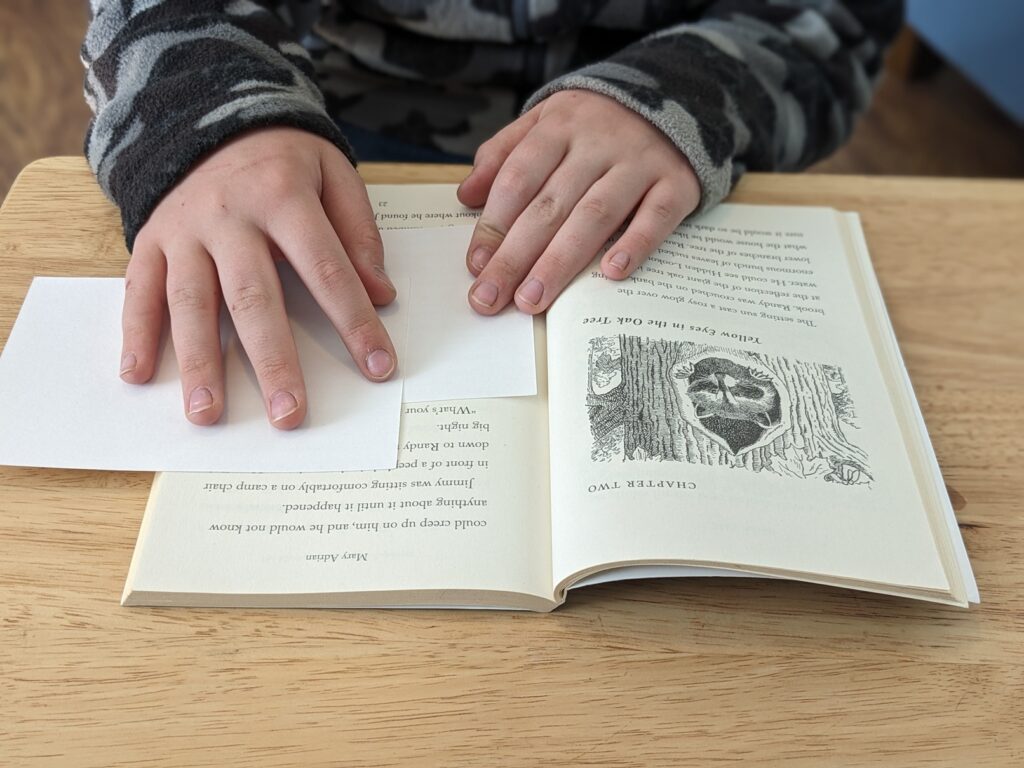
Balance and Physical Orientation
Part of the non-literary side of the program, which really surprised me, was integrating being “on point” with my balance and hearing. Before starting, I had an idea that being dyslexic might throw my kinesthetic ability off slightly. I never thought it had any effect on my hearing.
The balance exercise involves being orientated and standing on one leg and moving my mind’s eye around until I find a point where I’m perfectly balanced. Wow! Suddenly I am super balanced and barely have to do any muscle control of my legs.
The formal exercise to check this is using Koosh Balls to play catch. The benefit of these balls is that they don’t bounce very much so it’s fairly easy to catch. It feels like I suddenly gain a superhuman ability to catch these balls while still on one leg, as long as I stay “on point”. The moment I drift off point is the moment I drop a ball or lose my balance.
Hearing and Sound Orientation
Now to the part which really, really surprised me: I am able to move my hearing along with my mind’s eye. I’ve always been aware of being able to mentally conjure up pictures and play through scenarios, seeing things in 3-D in my head is easy for me. What I had not been aware of until now is that I’m able to move my hearing around. I just assumed everybody could move their hearing into a conversation next to them and listen as if sitting there, but clearly it’s a dyslexia talent again.
The ability to orientate my hearing involved playing sound through sets of headphones. I spent a long time convinced something was coming into my right ear, which turns out to be my dominant ear. Once I had completed the exercise with Tessa’s coaching, I was able to get the sound to come out where my mind’s eye is, and everything felt nicely in calibration. That very evening while watching the TV, I became aware of how it sounds different and my improved ability to listen to someone having a conversation with me and, more importantly, noticing when my hearing is drifting off somewhere else.
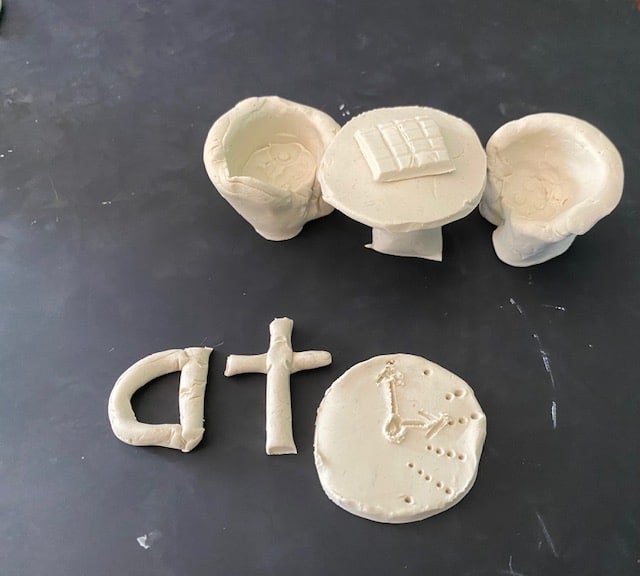
Symbol Mastery: The Heart of the Program
After ensuring I was able to orientate, we moved onto “Symbol mastery”, which is probably the core of Davis® Mastery for Dyslexia. Like “Alphabet Mastery”, this involves using plasticine, but this time to model up the meaning of words.
I started off by modelling meanings for parts of the English language, for example: adjective, verb, and preposition. These parts of language have always felt like abstract concepts to me. I had to learn them to pass my English GCSE when I was at school, not really grasping what they actually mean and how they are used. Now, having modelled these words in plasticine and then going through the Davis mastering process I am comfortable with the meaning of these words and how they are structured in language.
About the Author: Mathew Head
I have been statemented with dyslexia from about 6 years old. I have created a website Dyslexia Life Hacks, this shares the various tools and techniques I have developed over the years to make life easier, and is a safe space for you to share your thoughts and suggestions for further hacks!
Another remarkable part of this process is that spelling also gets mastered. As part of the learning process, I modelled “preposition” twice. The second time I had a better understanding of how to make a model that made sense to me and what it felt like to have it fully mastered. Once I had mastered preposition – a complicated word – I became confident in the spelling of it, not even having to second-guess myself.
Tackling Trigger Words
We then moved on to tackling my trigger words. Put simply, these are words I do not have a mental picture for, so as I read them I get a blank. For me, this is where symbol mastery gets challenging but also rewarding.
The trigger words I selected to master with Tessa’s help initially were: “the”, “a”, “from”, and “their”. Trying to model the meaning of a word when you have a complete blank mental picture is really tough. This is where the modelling comes into its own. After looking the definition up in various dictionary resources, I would start with an initial part of a model to see how it felt to me.
This was hard. Having a complete blank and trying to conjure up something in plasticine takes a lot of trial and error. I would initially start one idea and I just get the feeling that the model isn’t really talking the definition to me. Tessa would provide guidance and prompts to get me thinking about what I wanted from the model and I would try something else. This would be an improvement but it might not feel right. I remember sitting for ages looking at “their”, feeling quite frustrated that I could not show a sense of ownership in the model. A few more iterations on and I got a model I was happy with. Then it was a case of writing out the word underneath the model with clay letters from my alphabet and carrying out the mastering process.
Sometimes the modelling can take nearly an hour to get to a point where, without even looking at the dictionary or any other prompts, I can use just a model in my mind to know the meaning. It would just be feeling inside like, “that’s it – that’s the model that makes sense”.
The mastering process takes a matter of 2 to 3 minutes and this still amazes me. The gift of mastery truly is a gift.
Spelling: From Weakness to Strength
Spelling has always been a particularly weak point of mine; however, using the techniques laid out in Davis® Mastery for Dyslexia, I am well on the path to eradicating this weakness. Symbol mastery is used to understand the definition and get the spelling of words when I do not necessarily know the definition.
For words that I already have a strong definition/mental picture of and cannot spell, there is an alternative technique. This involves eradicating old incorrect spellings, getting orientated, and spelling the word correctly to myself forward and backwards and then mastering it – the gift of mastery paving the way once again! It’s that straightforward.
Moving Forward
Now that I have completed the program, the true hard work really starts. I need to complete the 250 trigger words with symbol mastery to truly have my dyslexia corrected. I am highly motivated and driven to complete this part. I already feel a change within myself and my outlook.
Removing some of the self-limiting beliefs, misinformation, negative self-talk, and old solutions has massively grown my confidence in my ability to not only learn the English language, which is a beast I now feel more comfortable with, but also to learn other things, for example, playing the guitar or teaching myself basic piano.
With the removal of the voice that nags in the back of my head saying “you are rubbish at learning things” I have been able to replace it with one that says, “you have a gift that allows you to master things very quickly”. Having the tools to understand when I am disorientated, therefore enabling me to get back “on point” if needed, is already paying off in day-to-day life.
I would urge anybody who is dyslexic or knows somebody with dyslexia to use this program to enrich their life. It is well worth the money invested in it and will pay off for years to come.
Read our latest posts
- Davis UKIE: NeuroNavigators: Building Early Engagement with Davis
- Davis UKIE: Exploring a New Understanding of Neurodiversity at IE University
- Adult Dyslexia: The Workplace Advantage You’re Not Using
- Davis North America: Davis Facilitator Screens “Who Knew” Documentary for Lewis County Healthcare Professionals
- Meltdowns vs. Tantrums
By Cathie Geraci, Davis® Facilitator
When people ask me what I do, I tell them: “I help individuals understand how their intelligence works.” Yes, I help dyslexics learn to read, dyscalculics understand math, ADHDers manage attention and behavior, and autistic individuals make sense of the world around them. But ultimately, my clients discover how their thinking style holds strengths—and how it has also created challenges in learning and understanding.
Until recently, all my clients came from families who had their needs met. Families with the time to focus on a child’s learning struggles. Families with the resources to seek help.
But there are approximately 15 million children living in refugee camps worldwide, and fewer than half attend school. Among those who do, neurodiverse students often cannot learn effectively. Imagine growing up in a refugee camp, finally receiving the chance to learn, only to find that your brain won’t let you. It’s a double injustice. These children—some of the most vulnerable neurodiverse learners anywhere—are the ones I had the privilege to work with.
Let me tell you about Still I Rise International School.
Located in the heart of the Nairobi slums, it serves vulnerable children and refugees. Most students are local; they arrive each morning from the slums and return home each evening. A smaller group boards at the school, having come from the Kakuma Refugee Camp in Kenya or from Still I Rise emergency schools in Yemen and Congo.
This school is extraordinary. Walking through its gates, you might think you entered an elite Kenyan private school: well-kept grounds, lush gardens, a swimming pool, after-school clubs. But what truly makes it special is not that it serves slum communities and refugees, nor that it is entirely free. It is the only free school in the world for vulnerable and refugee students that offers the International Baccalaureate curriculum.
I met the school’s founder, Nicolò Govoni, in November 2024 while he was presenting his book Un Mondo Possibile. I asked whether he had dyslexic students and mentioned that I thought I could help. One year later, I found myself at the school facilitating two Davis Mastery for Dyslexia® programs.
Ryan
Ryan is 13 and lives in the slums with his mother and sister. His life is marked by extreme economic instability, yet nothing escapes his extraordinary visual-scanning ability. He is curious, thoughtful, and passionate about fencing. Despite being at the school for several years, he struggled with reading comprehension, writing, focus, and daily behavioral challenges.
After one week together, Ryan is now reading at grade level, writing comfortably—even in cursive—and maintaining focus. Most importantly, he now recognizes when he is the source of both his positive and negative behaviors. I am confident that in the months ahead, Ryan will become the student he wants to be, moving steadily toward his dream of working in cybersecurity.
Yaya
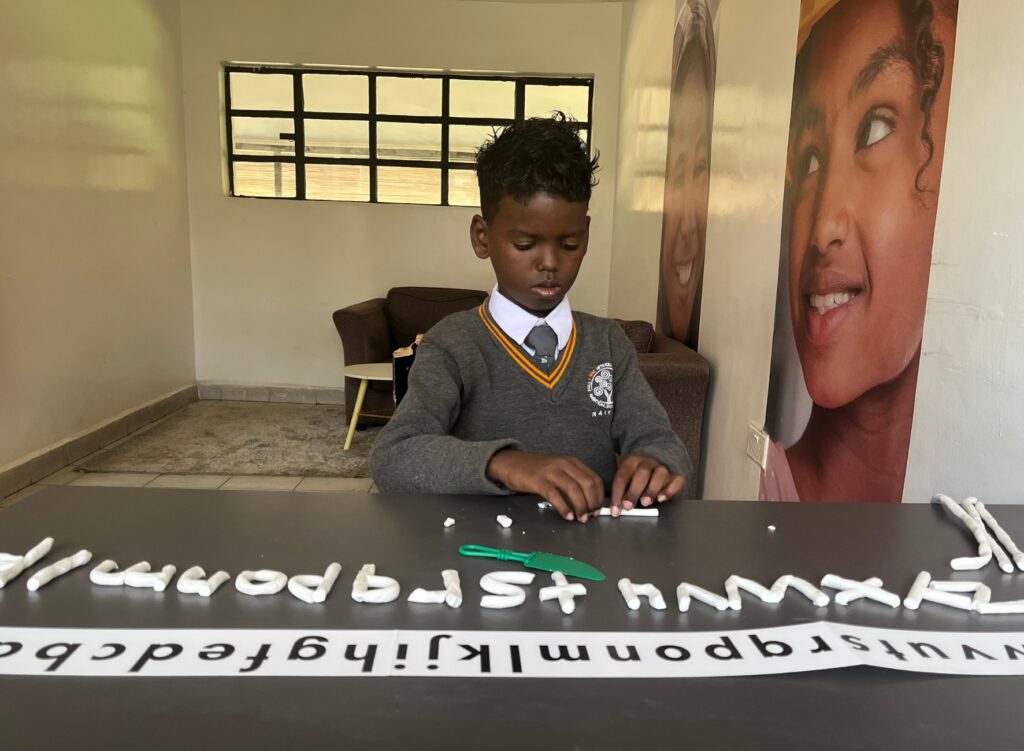
Yaya is 12 and comes from the Kakuma Refugee Camp. He left Ethiopia at age five and has spent most of his life in the camp. He is curious, kind, determined, and dreams of becoming the President of Ethiopia one day—to solve his country’s problems. Since arriving at the school just ten months ago, he has had to learn English, math, and reading all at once.
Although naturally gifted in math, Yaya could not yet read. He had developed many clever strategies to guess words and make it appear as though he could read. His motivation, however, was remarkable. By lunchtime on the final day of his program, something “clicked”—the mechanism for reading finally activated. I am confident he will be reading independently within months and soon be as strong in every subject as he is in math.
My time at Still I Rise International School was transformative. For these two students, it marked the beginning of understanding how their intelligence works and the end of the barriers that once held them back. I hope this is only the start of helping many more students there.
For me, it was a masterclass in human resilience. These students possess extraordinary motivation and remain connected to joy, despite having endured some of the harshest conditions on Earth. So while I helped two students understand their intelligence, the students of Still I Rise taught me how to be a better human being.
If you feel inspired to learn more, please visit www.stillirise.org.
Would you like to know more about the Davis® Mastery for Dyslexia? Contact us
December 6-7, 2025 | Free live online event
Your child isn’t broken. Traditional approaches weren’t made for their mind.
Two transformative days exploring autism through the Davis lens — discovering why your child experiences the world differently and how to support them without changing who they are.
Live attendance: FREE
Can’t make it live? Lifetime recordings: £12.99
Finally, answers that make sense
You’ve sat through countless meetings where professionals describe your child’s “deficits.” You’ve tried behavioral interventions that feel like forcing a square peg into a round hole. You’re exhausted from being told what your child can’t do.
What if we’ve been looking at autism all wrong?
Join families, educators, and professionals from 5 continents for a weekend that reframes everything. No deficit talk. No compliance training. Just breakthrough insights into how autistic minds actually work — and practical tools that honor that difference.
What you’ll Discover
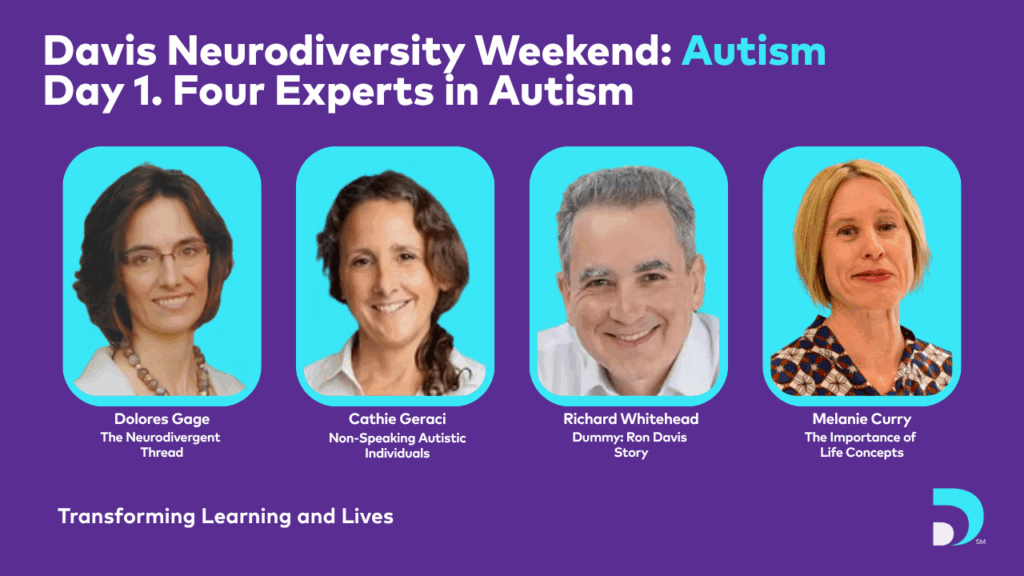
Saturday, December 6
5:45 PM GMT – Opening & Welcome
Featuring a personal message from Ron Davis, whose own autistic experience led to these revolutionary approaches.
6:00 PM – The Neurodivergent Thread with Dolores Gage
Why your child’s meltdowns, confusion, and sensory overwhelm all stem from the same source — and why that source is also their greatest strength.
7:30 PM – Non-Speaking Autistic Individuals with Cathie Geraci
Your non-speaking child has a rich inner world. Learn how Davis methods help restore calm and unlock communication without forcing speech.
9:00 PM – Dummy: Ron’s Story with Richard Whitehead
Preview Ron Davis’s autobiography — from non-speaking and “unreachable” to developing methods that have helped thousands worldwide.
10:30 PM – Missing Concepts and Individuation with Melanie Curry
Why your child might not recognize themselves in the mirror, understand “you” and “me,” or grasp cause and effect — and how to build these foundations gently.
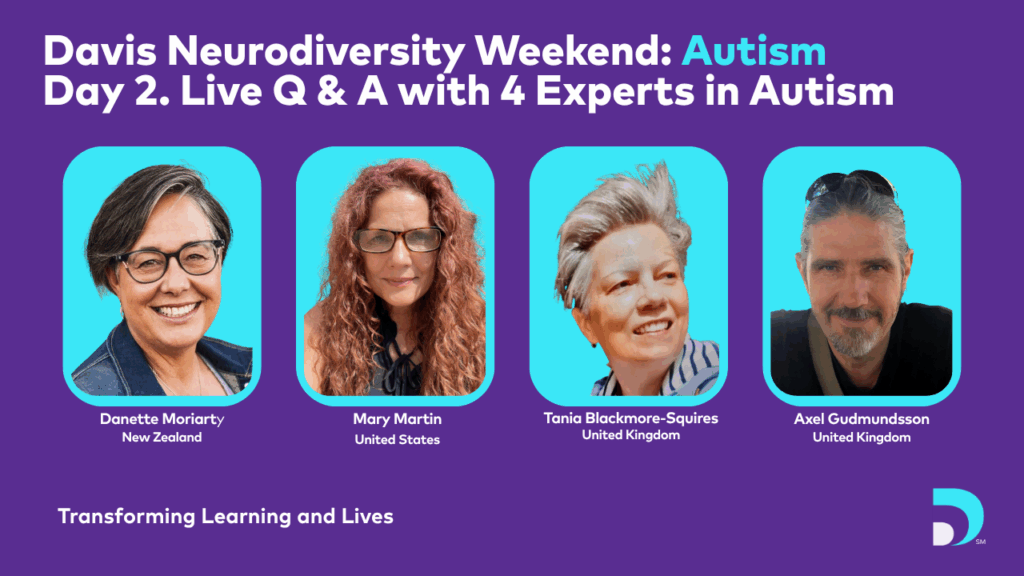
Sunday, December 7
7:30 PM GMT – Facilitator Panel + Your Questions Answered
Real families. Real breakthroughs. Davis facilitators share stories of transformation and answer your specific questions live.
Featuring: Tania Blackmore-Squires, Axel Gudmundsson, Mary Martin, Danette Moriarty
Who This Is For
Parents living with:
- Daily meltdowns you can’t predict or prevent
- A child who seems “unreachable” at times
- School calling constantly about behavior
- Therapy approaches that aren’t working
- Exhaustion from trying everything
You’ll leave with:
- Understanding of why your child’s brain works differently
- Practical tools you can use immediately
- Hope based on real success stories
- Connection with families who truly get it
- Clear next steps for your journey
Global event, local times
This event bridges time zones to unite our worldwide community:
Saturday Opening (5:45 PM GMT):
- London: 5:45 PM
- Paris/Berlin: 6:45 PM
- Johannesburg: 7:45 PM
- New York: 12:45 PM
- Los Angeles: 9:45 AM
- Auckland: 6:45 AM Sunday
- Sydney: 4:45 AM Sunday
Can’t make all sessions live? You can purchase lifetime recordings for £12.99.
Why Davis Is Different
We Don’t Try to “Fix” Autism
Your child’s different perception isn’t wrong — it’s just different. Davis methods work with how autistic minds naturally function.
Created BY Autistic Experience
Ron Davis was non-speaking until age 17. These aren’t theories developed in labs — they’re insights from lived experience.
Concepts, Not Compliance
Instead of behavior modification, we build the missing conceptual foundations that make the world make sense.
Tools That Last
Families report continued growth years after learning Davis methods. The tools grow with your child.
What others are saying about the Davis Autism Approach®
“The program didn’t try to change who he is. It gave him tools to understand and embrace himself – and that has made all the difference.” Louise, Mother of program participant
“I see how the stronger sense of who I am has allowed me to say no to what isn’t for me and say yes to what makes me happy. I no longer have to be reacting to everything happening around me. I can be centered and decide what is for me and what is not for me. I choose to respond rather than react. It feels so freeing.” Leigh, program participant
“Sophia was a frightened, fearful child who was withdrawn and living inside of herself. Since completing the program two years ago, she has become a typical young girl. She is two cycles away from completing her black belt in Taekwondo. She wants to work for Lucas films as an animator one day. Our lives are now ‘normal’ – we laugh as a family, we cry as a family, we encourage one another, we strengthen one another. We hadn’t experienced that before.” Mary, Mother of program participant
“I can’t believe how life-changing these concepts are. I use them all of the time in my life now – it is just so easy to take responsibility for things that had always seemed impossible before.” This person wished to remain anonymous
Common questions
Q: Is this for parents only?
A: While designed with parents in mind, educators, therapists, and autistic individuals would all benefit from these insights.
Q: My child was just diagnosed. Is this too advanced?
A: Perfect timing. Understanding the Davis perspective early saves years of inappropriate interventions.
Q: My child is an adult. Is it too late?
A: Never. Davis methods work across all ages. Many adults discover themselves through these concepts.
Q: What if I can only attend some sessions?
A: Register anyway. Each session stands alone with valuable insights. Recordings available for what you miss for only £12.99.
Q: How is this different from other autism seminars?
A: We don’t talk about deficits, disorders, or “fixing.” We explore how autistic perception works and how to support it.
A Personal Note from the Organizers
Every day, we see families exhausted from approaches that don’t work. Parents blamed for their child’s struggles. Children forced into boxes that don’t fit.
This weekend is different. It’s about understanding, not changing. Supporting, not suppressing. Hope based on real success, not false promises.
Your child’s autism isn’t a tragedy to overcome. It’s a different way of experiencing the world — one that includes incredible gifts alongside real challenges.
Join us to discover what becomes possible when we stop trying to “fix” and start trying to understand.
Organized By:
Davis UK & Ireland in partnership with Davis Autism International
Don’t Miss This
Two days that could change how you see your child — and how they see themselves.
December 6-7, 2025
Live: FREE
Recordings: £12.99
By Nadine Schumont, Licensed Davis® Facilitator
Some days in this work stay with you forever. Today was one of those days.
A 10-year-old former client asked his parents if he could visit me on his day off from school. Not because he was in crisis. Not because something was wrong. Just because he was in town and wanted to see me.
He’d completed Davis Concepts for Life® with me two years ago, when he was eight. That he wanted to come back just to visit? That alone made my day.
When children choose to return
We sat down together, and I asked how things were going. His mom had mentioned a few areas we might explore, but I wanted to hear from him first.
“Let’s think about situations that sometimes feel hard,” I suggested. “Moments where you might wish you’d handled things differently.”
He nodded and launched straight into his story.
The sandbox incident
Back in September, he’d dug a hole in the school sandbox. A really good hole. Ever since, he’d been watching it, protecting it, making sure it stayed exactly how he wanted it.
Then last week, another child started filling it with wet sand.
“I got so upset,” he told me. “We were yelling at each other, and then… I hit him.”
The shame in his voice was palpable. He knew he’d made a mistake. But more importantly, he couldn’t understand why he’d lost control over something that now seemed so small.

Making it tangible
We went into the clay room – the heart of Davis work. I asked him to model what happened, but in reverse order. This is something we do to help children see the sequence of events and recognize where they had choices.
He modeled:
- The hitting (what happened last)
- The yelling (the escalation)
- The boy filling the hole (the trigger)
- The quiet moment before anything happened
That last model – the calm before the storm – that’s where the magic happens.
The questions that changed everything
Looking at his clay scene, I asked, “Who made this hole?”
“I did – back in September.”
“Do you own the school property?”
He actually laughed. “No.”
“So if the sandbox belongs to everyone, does that mean anyone can play in it?”
He nodded, already seeing where this was going.
“Okay,” I said, “so if we go back to that moment when you were still in order – before your emotions took off – what other decision could you make?”
He paused. His face changed. A smile spread across it.
“I could just go make another hole.”
The power of self-discovery
I’ve been doing this work for years, and these moments never get old. That instant when a child realizes they have choices they never saw before. When the rigid thinking that trapped them suddenly becomes flexible.
We weren’t done yet. Using the Davis “Creating a New Behavior” procedure, we modeled what that new choice would look like. How he could recognize the moment before his emotions ramped up. How he could choose differently.
As we worked with the clay, he started connecting dots on his own.
“It’s all self-created energy, isn’t it?” he said. “My thoughts created my feelings, and my feelings created what I did.”
This is a 10-year-old, folks. Understanding emotional regulation at a level many adults never reach.
Beyond the sandbox
Later in our session, completely unprompted, he made another observation:
“Sometimes I use disorder to frustrate my mom.”
I hadn’t brought up his home behavior. His mom hadn’t mentioned this pattern. He discovered it himself, just by having the conceptual framework to understand his own actions.
We talked about how he could use his “dial” – an internal regulation tool from his original program – to turn down his energy when emotions rise. How he could walk away, breathe, and come back when ready.
“Yeah,” he grinned, “I can turn my dial down and make a different choice.”
What parents need to know
If your child:
- Fixates on keeping things “just right”
- Melts down when their plans are disrupted
- Can’t let go when something changes
- Hits or lashes out over seemingly small things
They’re not being defiant. They’re not manipulative. They’re missing fundamental life concepts that help us understand:
- We don’t control everything (and that’s okay)
- Change is survivable
- We always have choices
- Our emotions don’t have to control us
Why the Davis Concepts for Life® last
This is what amazes me about Davis work. Two years after his program, these concepts aren’t just remembered – they’re alive and growing.
I didn’t reteach him anything today. The concepts he mastered at age eight were still there, ready to apply to new situations. They’d matured with him.
His mother tells me he’s doing so much better overall. When he struggles and asks “But why?” she simply responds, “What did I tell you?” This gentle cue helps him pause and access what he already knows.
The invitation to grow
Every child who comes through my practice leaves with these tools:
- Understanding of emotion as self-created energy
- The ability to recognize order and disorder
- Tools to regulate their internal state
- Awareness of choice in every moment
But more than tools, they leave with an invitation – to keep growing, keep discovering, keep applying these concepts to new challenges as they arise.
A personal note
After 10 years as a Davis® Facilitator, I can tell you this: the children who seem most “stuck” often have the biggest breakthroughs. The boy who couldn’t let go of a sandbox hole? He’s now a child who understands flexibility, choice, and self-regulation.
His parting words to me today? “Thanks for helping me see I always have another choice.”
That’s why I do this work. Not to control behavior, but to unleash understanding. Not to manage children, but to empower them.
Because every child deserves their “I could just make another hole” moment.
About Davis Concepts for Life®
The Davis Concepts for Life® program provides individuals with the conceptual foundation necessary for emotional and social growth. Through clay modeling and experiential learning, participants master life concepts that many of us take for granted but that can be revolutionary for neurodivergent minds.
The program typically runs 30-60 hours over several weeks, paced to match each individual’s needs. It’s suitable for ages 8 through adult and particularly beneficial for individuals with autism, ADHD, and related profiles – including multi diagnosis and treatment resistant individuals.
Want to learn more?
If this story resonates with your family’s experience, you’re not alone. Many children are missing these fundamental concepts, leading to behavioral challenges that seem insurmountable.
They’re not. With the right approach, breakthrough is possible.
Find a Licensed Davis® Facilitator Near You
Learn about the Davis Concepts for Life® Program
Have questions? Or unsure whether this approach is right for you? Contact us
Nadine is a Licensed Davis® Facilitator whose own journey own with undiagnosed ADHD and dyslexia led her to take a Davis program in 2017. Since then, Nadine had been supporting neurodivergent individuals and their families. Based in Stratford, Ontario, Canada, Nadine provides both in-person and online programs. This story is shared with permission, with identifying details changed for privacy.
Have a story to share about your Davis® experience? We’d love to hear from you. Contact us
By Ronald D. Davis
Original article from the Dyslexic Reader 2002: The following is a description of an experiment he conducted in 1982 to prove to himself that disoriented perceptions are a natural function of the brain. This understanding of how the use of a natural brain function not only produces the symptoms of dyslexia, but also the many talents dyslexic thinkers can exhibit, serves as one of the foundations of Davis Mastery for Dyslexia®. It explains the tools which allow dyslexic thinkers to intentionally control the distorted perceptions that are a product of disorientation—to both eliminate a learning disability and to enhance their talents.

Setting the stage: 1982
In 1982, after my colleagues and I had arrived at a basic, rudimentary understanding of what had to be done to correct dyslexia, we offered a program for doing so to the public. The program was producing spectacular results, and we gathered a great deal of empirical evidence to support it. But the program and I were being criticized and ridiculed by the established authorities on dyslexia. This was because the developmental model for dyslexia was such a major departure from the structural model (brain damage or malfunction) that was accepted at the time. In addition, I lacked any formal training or credential in the field, so I was quickly branded a kook or snake oil salesman.
I searched in vain for anything that would support the concept that distortion in perception was at the root of dyslexia symptoms. I couldn’t even find a simple explanation of perceptual distortion, why it happened, how it happened, or what it was called.
The motivation
My primary motivation was to establish that dyslexia was not the result of brain damage or malfunction. I wanted to find a way to prove that all of the symptoms of dyslexia could be produced by a normal brain functioning naturally. I felt that if I could make a link between the perceptual distortions, which even non-dyslexics experience, and dyslexia symptoms, it would prove that the symptoms of dyslexia were not evidence of brain damage or malfunction. I didn’t know where to begin.
The breakthrough moment
Then one day I was driving into the office. We had just had about two weeks of cold, gray, rainy weather.
That morning it was warm, bright, and sunny. I wanted to play hooky from work and go for a drive in the redwood forest. I was stopped at a stoplight, with my mind already in the redwoods, when suddenly I felt that I was going to bump into the car in front of me. I naturally pushed harder and harder on the brake but I wasn’t stopping. Suddenly I realized, it’s not me moving, it’s the other car rolling backward towards me! A toot of my horn prevented a bump, but my mind began to race. This firsthand experience of the phenomenon (distorted sensory perceptions) I had been talking about for months caused a shift in my perspective. If I could reproduce this same effect in a controlled situation, I might be able to prove my theory.
The experiment begins
That day I set up an experiment. The equipment was an old 33-1/3 speed record player, standing on its side. Attached to the turn table was a large cardboard disk with a spiral painted on it. With a foot switch so the device could be turned on and off without using a hand, a stop watch, a tape recorder, and a clipboard, I was ready to explore perceptual distortion. I was the first test subject. I sat in front of the disk looking at the center of the spiral. A press of my foot, and the disk began to spin. In less than five seconds I felt the motion. The speed of the disk was so fast that the sense of motion was like flying down an endless tunnel.
The goal of the experiment was to produce dyslexia symptoms in a non- dyslexic brain. But before that could be established, the equipment had to produce dyslexic symptoms in a dyslexic brain. Based on the developmental model, the symptoms of dyslexia came from distortions in the senses. The senses most affected were vision, hearing, balance, motion, and time.

Phase one: Vision
The first thing I noticed performing the experiment on myself was that just before the feeling of movement began, the speed of the spinning disk appeared to slow down. This indicated that not only was my sense of motion distorting, but also my sense of vision.
Phase two: Balance
The second phase of the experiment was to stand in front of the disk balancing on one foot, turn the disk on, and try to maintain balance. I don’t recommend doing this without an assistant to turn the disk on for you and, more importantly, to catch you when you begin to fall–because you will fall over backwards. The spinning spiral definitely distorted the sense of balance.
Phase three: Time
The third phase was to sit in front of the stationary disk with a stopwatch in hand. While looking at the center of the spiral, I tried to estimate the passage of fifteen seconds by clicking the stopwatch on, and when I thought fifteen seconds had elapsed, I clicked it off. In five attempts I was never more than three seconds off. The next part was to start the disk spinning, and try the same thing. In five attempts I never got closer than five seconds, and twice I was more than ten seconds off. My sense of time was definitely distorting.
Phase four: Hearing
The fourth phase was to turn on the tape recorder, spin the disk, and after the feeling of motion began, have an assistant say something to me, and repeat back what I heard. We used nursery rhymes like, “Sally sells sea shells at the sea shore.” Only the assistant would deliberately alter the words, like, “Sally tells sea snails at the sea shore.” Or, “Sally sells seashores to seahorses.” I could not hear exactly what the assistant said, and the proof was on the tape.
Testing a Hundred People
So with less than $100 of equipment, I demonstrated for myself that my brain distorted the senses of vision, hearing, balance, motion, and time. The experiment produced dyslexic symptoms in a dyslexic brain. Now I was ready to try the same thing on a non-dyslexic brain. I decided to put one hundred people through the steps of the experiment. I wouldn’t even attempt to pre- determine whether or not they were dyslexic. I wanted a cross section of the population.
I started doing the experiment with anyone who was willing to sit in front of the spinning disk. I soon discovered that I needed another piece of equipment – a plastic-lined waste can. I also discovered that I needed to change the protocol. At first I let others observe someone going through the experiment. Their observations influenced their own experience. So observation was permitted only after having had the experience.
Some people were made too nauseous by the spinning disk to complete all four phases of the experiment. But there was perceptual distortion in the phases they did complete. And everyone who completed the series experienced distorted vision, hearing, balance, motion, and time. Age, intelligence, education, gender, race, etc. didn’t matter–the results were consistent.
Then one evening a young woman, the forty-eighth test subject, was sitting in front of the spinning disk. She sat there on the verge of vomiting for about three minutes, then fell to the floor and had a grand mal seizure. The unexpected event scared me; it terrified her. She had never had a seizure before, and I had never seen one that up close and personal. I felt responsible for making it happen.
I had satisfied my own curiosity. I had nearly fifty test results, all of which confirmed my theory. After all, I didn’t have a graduate degree hanging in the balance. I concluded that I had proven my point, so the hundred person experiment ended at only forty-eight.
Talents which can be enhanced by disoriented perceptions
- Spatial awareness and design
- Strategic planning and problem-solving
- Mechanical and engineering work
- Creative fields like art, music, and drama
- Athletics and piloting
- Inventing and storytelling
Thus, the goal of Davis Orientation Counseling is not the elimination of disorientation, but the ability to consciously control it when it acts as a barrier to reading, writing, doing arithmetic, or succeeding in a traditional educational setting.
Ready to learn more? Get in touch with our team to discuss your questions about dyslexia, or explore how the Davis® Mastery for Dyslexia can help you or your child thrive.
Contact us
Guest post by Tracy Doyle, Davis Facilitator
Math can feel like a foreign language, especially for learners whose brilliance shines in pictures, spatial thinking, and creativity. It isn’t that these kids can’t learn—it’s that the traditional way of teaching math often doesn’t align with how their minds naturally process information.
For students with dyslexia or dyscalculia, the symbols, sequences, and linguistic twists in math can create confusion rather than clarity. Dyslexic learners, for instance, often excel at three-dimensional or spatial reasoning but struggle with rote memory, symbols, and step-by-step logic—exactly the areas where so much of math typically lives.
That’s why the Davis® Mastery for Math Program offers such a profound shift. It meets learners where they are: visual, kinesthetic, big-picture thinkers, and invites them into math in a way that genuinely makes sense.
Natalie’s Transformation
When Natalie began her program, she was clear on what she wanted:
- To feel more confident
- To improve her math skills
- To ease the anxiety that often crept in during learning
And she did blossom. Natalie learned to work with her picture-thinking mind instead of fighting it. Concepts that once felt daunting—like addition, place value, fractions, and negative numbers—began to make sense in a whole new way.
Her measurable progress tells the story:
- Basic concepts: from grade equivalent 3.1 to 4.8
- Operations: from grade equivalent K to 3.3
- Applications: from grade equivalent 2.6 to 3.3
Through hands-on tools, clay modeling, and strategies for regulating focus, energy, and emotions, Natalie didn’t just grow mathematically—she built a stronger connection to herself. She walked away not only with math tools but with a deeper understanding of how her brilliant mind works. That’s not just change; that’s empowerment.
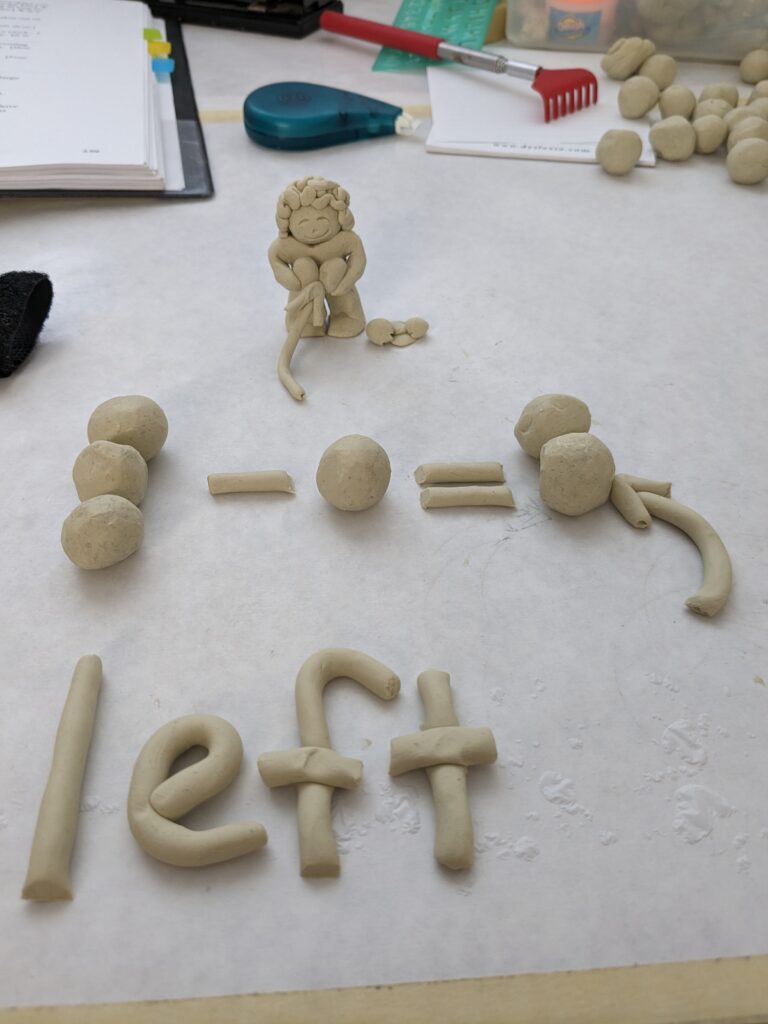
How This Approach Connects with What We Know
Visual, multisensory learning builds real understanding. Research and experience show that visual and manipulative strategies—like using beads, clay models, or pictorial overviews—help bridge abstract math concepts. When learners see and touch the math, it becomes anchored, meaningful, and memorable.
Math anxiety often stems from language and symbol confusion. Words like “from,” “by,” and other everyday words in math problems can trigger confusion for picture thinkers. They may recognize the words but can’t translate them into picture meaning, and that’s where true understanding falls apart.
At the root of math struggles lies disorientation, not laziness. Dyscalculia, the math-side counterpart to dyslexia, often stems from distorted perception. When you can’t intuitively grasp numbers or procedures because you’re disoriented, math becomes a maze. Approaches that address that orientation directly can be life-changing.
Natalie’s Story in the Bigger Picture
She’s not alone. Across the Dyslexia.com blog, you’ll find stories of students overwhelmed by numbers, math terms, or symbols, only to find joy and clarity when learning finally meets how they think.
This isn’t just healing academic wounds—it’s reigniting curiosity, confidence, and a sense of belonging in math.
If math has ever been a source of frustration, fear, or disconnection for your child, it doesn’t have to stay that way. The Davis® Mastery for Math Program offers an approach that changes everything because it starts with understanding how your child learns, not how we’ve traditionally taught.
Have questions about the Davis® Mastery for Math?
Contact us
Guest post by Sue Hall, Licensed Davis Facilitator, TedX Speaker, Author, Film Writer and gifted dyslexic
I was beyond excited to receive an invitation to deliver my first Keynote talk at the Edmonton Family Literacy Conference on October 8, 2025.
Even better?
After lunch, they were screening our documentary WHO KNEW Dyslexia is a Way of Thinking.

I love presenting at conferences and professional development sessions because of the unknown—those attendees’ ‘aha’ moments, the nods and smiles when I voice what they already know to be true.
When I share the unique ability of picture thinkers to alter perception, which leads to talents in the 3D world, and then explain how it works against us in the 2D world of print… when I explain that picture thinkers are image-based thinkers rather than sound thinkers and phonics just isn’t the way we learn to read… and when I share that picture thinkers need pictures to think with, and no image means no thinking—the overwhelming reaction is always the same: “I had no idea people thought like that.” Hence the title of the film.
The conference theme was to shift perception and disrupt. I opened by saying, “I promise to disrupt!” That part was easy.
After my talk and the film screening, there were plenty of questions and a great deal of emotion. I passed a notebook around, asking attendees to write their email if they wanted more details. The next morning I looked at the notebook… oh my… so many entries. It was affirming and heartwarming.
Here’s what happened next: A considerable number of attendees from Aboriginal and Metis communities wanted to book another talk, a professional development session, a film screening. I had shared that challenges can be significantly reduced with Davis Learning Strategies for K-3 teachers and The Whole Dyslexic Society’s pilot DLS for Early Years. The very next day, I heard from a province-wide association working with 3-5 year olds and a school district wanting to change their remediation methods.
I write this on Canadian Thanksgiving Day, and I could not be more grateful—for Ron Davis’s wisdom, for my calling as a Facilitator, for the invitations to enlighten educators of individuals from 3 to 80+. The message is clear: everyone is able to learn if they are taught in the way they were born to learn. They are definitely not learning disabled. And now way more educators know this and can share their ‘aha’ moments. Yay!
And there’s more exciting news: The WHO KNEW film director submitted the documentary to film festivals, and we just heard it’s been accepted to the Los Angeles Women in Film Festival (November 13-16, 2025)! She was beyond excited, too. Who knows what that will lead to? We just know it will be exciting and inspiring.
Want to experience your own ‘aha’ moment? Learn about Davis workshops and programs that can transform how you or your loved ones learn. Head to our solutions page.
Watch the documentary: Discover the full WHO KNEW story
Have questions about any of our Davis Programs or Workshops?
Complete the form below
Guest post by Stephen Martin, New Zealand
When we talk about neurodiversity, most people want clean labels. You’re “dyslexic” or you’ve got “ADHD” or maybe someone says you’re “on the spectrum.”
But for so many of us, it’s not one neat label. It’s a cocktail.
For me, dyslexia was the first word that gave my challenges a name. Reading from the board at school was nearly impossible, and that’s what got picked up. But fast-forward 20 years and suddenly I’m sitting in a doctor’s office, learning I also have ADHD. And when I really reflect, I know I carry traits from autism too — a love of routine, moments of social struggle.
This is the truth for so many people: we are not “one thing.” We’re a unique mix of traits, strengths, and challenges. It’s why one-size-fits-all solutions rarely work.

Why it feels like a cocktail
Each piece of neurodiversity adds its own flavour.
- Dyslexia gives us visual thinking, fast pattern recognition, but also the frustration of words not sticking the way they should.
- ADHD brings the kerosene, hyperactivity, dopamine-seeking, the racing energy that can be both gift and chaos.
- Autism traits can add a deep need for structure, a sensitivity to noise or light, or the feeling that social rules are written in a language we never got taught.
- Plus all the rest…
Put them together and you’ve got a cocktail that changes flavour depending on the day. Some days it’s a mojito, sharp, refreshing, full of energy. Other days it’s a hangover in a glass.
The Davis way of looking at it
What I love about the Davis Method is it doesn’t just chase symptoms. It asks: what’s the trigger?
Ron Davis understood that disorientation in the mind’s eye is at the core of dyslexia. That our brains are trying to see 3D meaning in 2D symbols, which leads to confusion. His approach is experiential, clay modelling, visualisation, life concepts. Instead of memorising, you build understanding with your hands and senses.
And here’s the powerful bit: this approach doesn’t stop with dyslexia.
The same life concepts work has helped people with ADHD, autism, dyscalculia, and more. Because at the root, all of these brains struggle with abstract concepts, time, cause and effect, or holding onto focus. Davis methods give those concepts a shape and a place in the mind.
A retrospective shift
Looking back, I wish more of us were told the truth earlier. That dyslexia was never just about spelling. That ADHD wasn’t just about being distracted. That autism wasn’t only about “social skills.”
They’re all connected. They all overlap. They’re different branches of the same neurodiverse tree.
And if we’re honest, so many adults only discover this cocktail later in life. That’s when the grief hits, what could my life have been like if I’d known at 20, not 40?
But awareness also brings possibility.
Why Davis makes a difference
The Davis Method isn’t a quick pill. It’s a way of rewiring how you see the world. For me, doing their Concepts for Life course was like having puzzle pieces finally slot into place. Suddenly time made sense. Cause and effect clicked. I wasn’t broken, my brain just needed a different way of learning.
That’s why I believe Davis programs can support across the board, dyslexia, ADHD, autism, dyscalculia, dyspraxia. Because they go to the root. They help us master the building blocks of thought in the way our brains actually work.
And when you shift the foundation, everything else in life gets lighter.
Final thought
So if you see yourself in this cocktail, a bit of ADHD, some dyslexia, maybe a splash of autism, know that you’re not alone. You’re not collecting diagnoses like Pokémon. You’re simply wired differently.
And that’s exactly why methods like Davis can make such a massive difference. They don’t try to pour your cocktail into someone else’s glass. They help you understand the mix you already have and use it to build a life that finally makes sense.
When The Cocktail Needs More Than Reading Support
If you recognize yourself in Stephen’s description – carrying ADHD, dyslexia, autism traits, or other neurodivergent characteristics – reading skills alone won’t solve everything.
The Davis Concepts for Life® program addresses the abstract concepts that all neurodivergent brains struggle with: time, cause and effect, motivation, responsibility, order, and relationships.
Why Concepts Matter
Stephen mentions how the Davis approach “doesn’t just chase symptoms” but asks “what’s the trigger?” The program uses clay modeling to make abstract concepts concrete, giving them shape and place in your mind through hands-on creation and real-world exploration.
You master fundamental cognitive concepts like cause and effect, time, order and disorder, motivation, and responsibility through plastilina clay modeling, then explore how these concepts work in your daily environment. You can read more about this in our blog post: A guide to understanding abstract life concepts.
What Changes
People who complete the program report increased self-awareness, stronger sense of self, improved executive functioning, better stress management, and enhanced ability to form and maintain relationships.
The program helps with executive functioning skills, stress, anxiety, focus, self-regulation, and behavior management – particularly beneficial for those struggling with forming and maintaining positive relationships.
The Approach
Programs run 50-70 hours, delivered one-on-one with a trained facilitator, either in-person or online. The flexible schedule spreads across several weeks, tailored to your specific needs and goals. Find out more about the Davis Concepts for Life program.
Unlike talk therapy, this uses creativity and experiential learning. You’re not memorizing concepts – you’re building them with your hands, then experiencing them in your life.
This Works Across The Cocktail
The program supports individuals with ADHD, autism, dyscalculia, and other neurodivergent profiles through hands-on methods that align with unique learning styles, no formal diagnosis is required.
As Stephen says: when you shift the foundation, everything else in life gets lighter.
Find a Licensed Davis® Facilitator in your area or learn more about the program here. If you are unsure whether the Davis® Concepts for Life program is right for you or someone you support, fill out the form below for a free Discovery Call – one of our team will speak with you about your specific needs.
Fout: Contact formulier niet gevonden.
About the author
Stephen Martin, based in New Zealand, is the creator of The Truth About Dyslexia podcast, with nearly a million downloads worldwide. Diagnosed with dyslexia as a child and ADHD as an adult, Stephen shares raw, real stories about the neurodiverse journey and what it takes to thrive.
He has worked with the Davis Method himself and is passionate about showing adults that dyslexia, ADHD, and autism are not just challenges, but part of a powerful mix of strengths.
Learn more about his dyslexia in adults podcast here or help him with his ADHD Sleep project survey if you have ADHD.
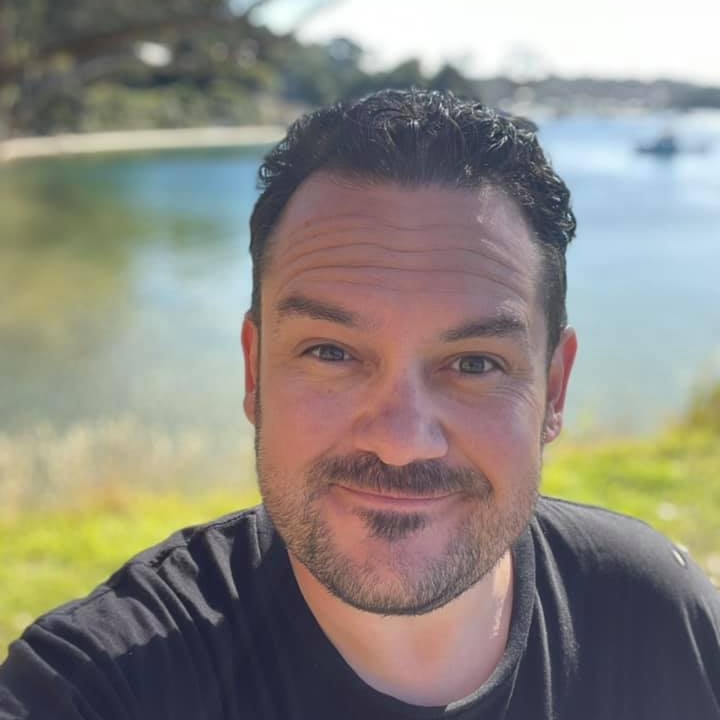
Guest Post by Stephen Martin, New Zealand
When I was first found to have dyslexia, I was about ten years old.
It wasn’t because I told my mum that words were moving on the page and in fact, that was never really my issue.
It was because I couldn’t copy words down off the blackboard and onto a piece of paper without getting a splitting headache.
I’d look up, then down, and the letters just wouldn’t stay still long enough to make sense.
It was exhausting.
That was the big sign for me that something wasn’t quite right.
Sure, I had spelling challenges too, but back then it was often brushed off as being “lazy” or “not trying hard enough.”
Luckily, someone saw past that and got me tested.
And that’s what’s wild because for so many of us, dyslexia doesn’t show up in just one way.
It’s not as simple as letters moving on a page.
The truth is, the visual side of dyslexia that most people think about, the swirling text, the jumping words and that’s only a small part of the story.
What often goes unseen is how dyslexia affects comprehension.
The hidden side of dyslexia
If you’ve ever read the same page three times and still couldn’t tell someone what it said, you’ll get this.
It’s like the words go in, but they don’t stick.
You might even start blaming yourself and thinking you’re lazy, distracted, or not focusing enough.
But you are focusing. Your brain’s just working differently.
People with dyslexia often think in pictures and stories, not words.
When we read, we don’t automatically “hear” the words in our heads like others do.
Instead, we translate them into visuals and into little movies.
That translation takes mental energy.
And by the time we’ve converted the words into meaning, we’re already tired.
So when someone asks, “What did that paragraph mean?” we draw a blank.
Not because we didn’t read it, but because our brain was busy doing the hard work behind the scenes just to make sense of it.

Why comprehension drains dyslexic brains
Reading isn’t something our brains evolved to do naturally and it’s a learned skill.
Most people’s brains eventually automate that decoding process.
But for many dyslexics, reading and comprehension use different neural pathways that take more effort to fire up.
It’s like running a race with a backpack full of bricks – you still finish, but it takes way more energy.
By the time you’ve decoded the words, you’ve got less energy left for understanding them.
That’s why it’s easy to reach the end of a page and realise you have no idea what you just read.
And it’s not just reading.
The same thing can happen when we listen.
When listening feels like reading
Ever listened to a podcast or an audiobook and found your mind wandering halfway through?
Then you suddenly realise you’ve missed ten minutes but can’t remember zoning out?
That’s the comprehension gap at work.
We hear the words, but they don’t all connect.
Our brains crave context think images, emotion, and stories to anchor the meaning.
That’s why dyslexic minds remember stories perfectly, but not the fine details.
Ask us what a book was about, and we might struggle.
Ask us what the main character went through, or what the scene looked like, we can tell you in vivid colour.
We don’t just remember information.
We remember experiences.
The cost of constant confusion
This comprehension challenge doesn’t just live in classrooms.
It follows us into adult life and into work meetings, emails, conversations, and relationships.
It can make you doubt yourself.
One moment you feel sharp, the next you’re lost.
And when you can’t quite grasp what’s being said, you start compensating, nodding along, pretending to understand, then piecing it together later.
That takes a huge emotional toll.
It’s why so many dyslexic adults describe feeling like they’re always behind and not because they can’t keep up, but because their brains are working twice as hard just to stay level.
But once you understand that comprehension is part of your dyslexia and not a personal flaw, you can start to work with it, not against it.
Three things that help when comprehension is the struggle
1. Use your picture brain on purpose
If your mind thinks in pictures, use it.
When you read something important, pause and see it.
Create a mini movie in your head.
The Davis® Mastery for Dyslexia actually teaches this – how to turn abstract words into real mental models so you understand what you read, not just recognise the words.
2. Slow down – speed isn’t understanding
We’ve been trained to read fast, as if speed equals intelligence.
But for dyslexic thinkers, comprehension lives in the pauses.
Slow reading lets your brain catch up and connect the visuals and that’s where meaning sticks.
3. Re-tell what you’ve read or heard
After reading or listening, try explaining it in your own words.
You don’t need to repeat it perfectly, just tell it like a story.
That act of storytelling helps your brain connect the language to your natural way of thinking – through pictures, emotion, and flow.
The bigger picture
Dyslexia isn’t just about reading and spelling.
It’s about how we make sense of the world.
We might not remember every sentence, but we see the big picture faster than most.
We connect patterns. We sense emotion. We understand people.
That’s comprehension too, just a different kind.
So if you’ve ever read a book and thought, “None of that stuck,” or listened to a talk and wondered where your brain went – take a breath.
You’re not broken.
Your brain just processes meaning in a way schools were never designed to measure.
And when you learn to work with that wiring – to use pictures, stories, and your natural way of thinking – comprehension finally starts to click.
Looking for help for Dyslexia? The Davis® Mastery for Dyslexia Program is suitable for all ages – yes, adults included!
If Stephen’s experience sounds familiar, you’re not alone.
The comprehension struggles he describes – reading without retaining, listening without connecting, constantly working twice as hard just to stay level – affect thousands of dyslexic adults and children.
The Davis® Mastery for Dyslexia program works with your picture-thinking brain, not against it. Through clay-based Symbol Mastery and orientation techniques, you learn to eliminate the confusion that causes words to slip away.
Learn more about the program here or find a Licensed Davis® Facilitator in your area.
If you are unsure whether the The Davis® Mastery for Dyslexia program is right for you or someone you support, fill out the form below – one of our team will speak with you about your specific needs.
About the author
Stephen Martin, based in New Zealand, is the creator of The Truth About Dyslexia podcast, with nearly a million downloads worldwide. Diagnosed with dyslexia as a child and ADHD as an adult, Stephen shares raw, real stories about the neurodiverse journey and what it takes to thrive. He has worked with the Davis Method himself and is passionate about showing adults that dyslexia, ADHD, and autism are not just challenges, but part of a powerful mix of strengths. Find out about his Dyslexia & ADHD in adults podcast here or his new Added Sleep Supplement here.

Libraries across the country are recognizing the power of neurodiversity programming to create inclusive spaces for all learners. This summer, our own Nadine Schumont demonstrated this commitment when she was featured at Stratford Public Library’s “Voices of the World” program on July 23.
From Client Inspiration to Community Education
Nadine shared her book Owen’s Rainbow Mind: A Mysterious Summer of Discovery — a story inspired by her client Owen and his younger brother Caleb. The book follows their magical summer adventure sparked by a mysterious map. Guided by a wise old owl, Owen learns to embrace his picture-thinking mind and use his unique strengths.
The story reflects the core philosophy behind the Davis Method: thinking differently isn’t a deficit — it’s a gift.
Interactive Learning That Makes a Difference
During the library event, participants engaged in interactive activities designed to help them step into Owen’s world. This hands-on approach mirrors the Davis Method’s signature clay-based learning techniques that help neurodivergent learners master concepts through tactile, visual experiences.
Recent research shows that libraries nationwide are developing programming specifically for neurodivergent youth and their families, creating sensory-friendly environments and autism-inclusive early literacy services. These initiatives recognize that different minds require different approaches to learning.
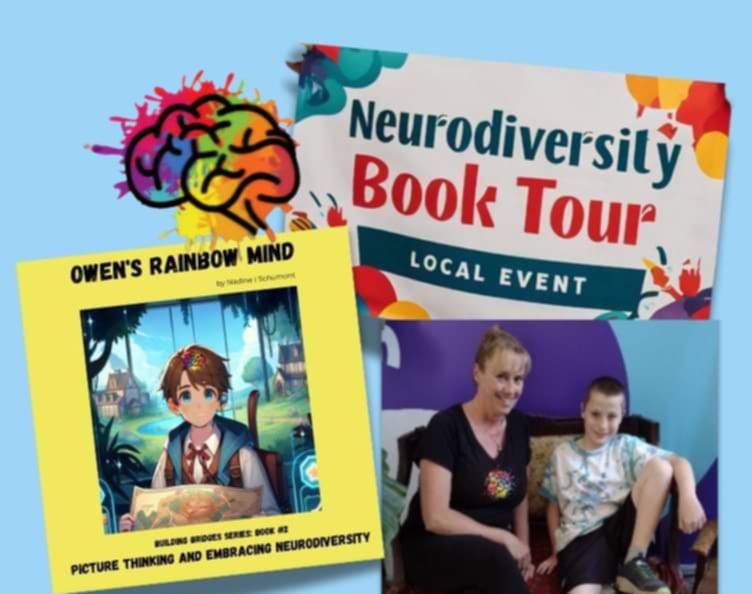
The Picture-Thinking Advantage
Neurodivergent individuals, including those with dyslexia, ADHD, and autism, tend to think non-verbally using mentally generated sensory impressions that can be visual, tactile, kinesthetic, or auditory. They are imaginative, creative, empathetic, and often solve problems by looking at the whole picture rather than working step-by-step.
This thinking style, which can seem challenging in traditional learning environments, becomes a superpower when properly understood and supported.
Beyond Accommodation: True Understanding
The Davis Method doesn’t rely on accommodations like special devices or medication. Instead, it teaches learners to:
- Master the orientation skills that eliminate confusion
- Create personal meaning for abstract concepts
- Use their natural picture-thinking abilities as learning tools
- Build permanent understanding rather than temporary fixes
The method is based on mastery — clients receive tools that enable them to master symbols and concepts that are foundations of learning and life. Once mastered, information is understood inherently and can transfer across situations and experiences.
Why Stories Matter
Owen’s story resonates because it shows a neurodivergent child discovering that being different is something to celebrate, not hide. Current research emphasizes the importance of books that promote respect and understanding for neurodiverse communities, advocating for positive learning environments that strive to make accommodations for all.
This aligns with our mission to help families understand that neurodiversity brings gifts alongside challenges.
Growing Recognition
Libraries are increasingly offering specialized programs for neurodivergent individuals, including sensory story times, neurodiversity clubs, and programming designed specifically for different learning styles. These programs recognize that traditional approaches don’t work for everyone.
The “Voices of the World” program at Stratford Public Library represents this growing awareness. By featuring stories like Owen’s, libraries help normalize different ways of thinking and learning.
The Davis Difference
As a Licensed Davis® Dyslexia Facilitator and Davis Autism Approach® Facilitator, Nadine brings unique insight to neurodiversity education. Nadine brings unique insight to neurodiversity education. Having completed the Davis® Program herself in 2018 after years of undiagnosed ADHD and dyslexia, she understands firsthand how life-changing this approach can be.
The Davis Method recognizes that dyslexic and many neurodivergent individuals are picture thinkers who experience perceptual disorientations in the senses of time, vision, hearing, and balance coordination. Nadine’s personal experience with these challenges allows her to connect with clients on a deeper level and guide them through their own transformation.
Rather than viewing these differences as problems to fix, the Davis approach teaches individuals to:
- Understand their unique learning style
- Develop self-regulation tools
- Master concepts through hands-on, creative methods
- Build confidence in their abilities
Looking Forward
Events like Nadine’s library presentation demonstrate the importance of community education about neurodiversity. When we share stories that celebrate different minds, we create a culture where all learners can thrive.
Whether you’re a parent, educator, or community member, understanding neurodiversity helps create more inclusive environments for everyone. After all, the world needs all kinds of minds — including rainbow minds like Owen’s.
Connect with Nadine here or find a Licensed Davis® Facilitator in you area here
Programs for Neurodivergent adults and those over the age of 8
Programs for Neurodivergent under the age of 8
Contact us
Math teachers routinely use multiple words for the same concept — add, plus, added to — switching between them naturally during lessons. But for dyslexic children, this seemingly simple language flexibility can create profound confusion.
A recent planning meeting with math teacher Geoffrey Ashiono highlighted this challenge and sparked a discussion about how Davis Method clay modeling can provide clarity where traditional teaching methods fall short.
The Language Confusion Problem
Math teachers naturally use synonymous terms interchangeably:
- Add or plus or added to
- Subtract or minus or take away
- Multiply or times or by
- Divide or share
While teachers understand these words mean the same thing, dyslexic children often don’t. When a teacher says “add” one minute, then “plus” the next, then “added to,” confusion sets in. Do they mean the same thing or different operations?
This uncertainty undermines mathematical confidence before calculations even begin.
Picture-Thinking Needs Context
Dyslexic learners are primarily picture-thinkers who benefit from concrete, visual representations. They need context and narrative to connect with learning — something that makes abstract concepts tangible and relatable.
Clay modeling provides exactly this foundation.
A Real Example: Watermelons and Addition
One 8-year-old learner came from a farm where they grew watermelons. The child loved watermelon, so his context for learning became watermelons. He also wanted to learn the meaning of “equal” — if his sister had three melons, he definitely wanted three melons too!
This personal connection became the foundation for understanding mathematical concepts.
Building Understanding Through Clay
First, establish the core concept:
Addition means “putting together” two or more quantities. When you add, you join something to something else so there is more. The “more” is crucial — it helps children realize the answer should always be bigger than the starting number.
Next, connect multiple terms to one meaning:
Using clay models, children learn that “add” has the same meaning as “plus” and that both connect to the + symbol. This gives certainty to children listening to mathematical language.
How the Clay Model Works
The child creates a visual representation using clay balls to represent quantities. For the equation 2 + 3 = 5:
Reading left to right: 2 plus 3 equals 5 Alternative reading: 3 added to 2 equals 5
Both phrasings use the same clay model and the same + symbol, making the connection clear.
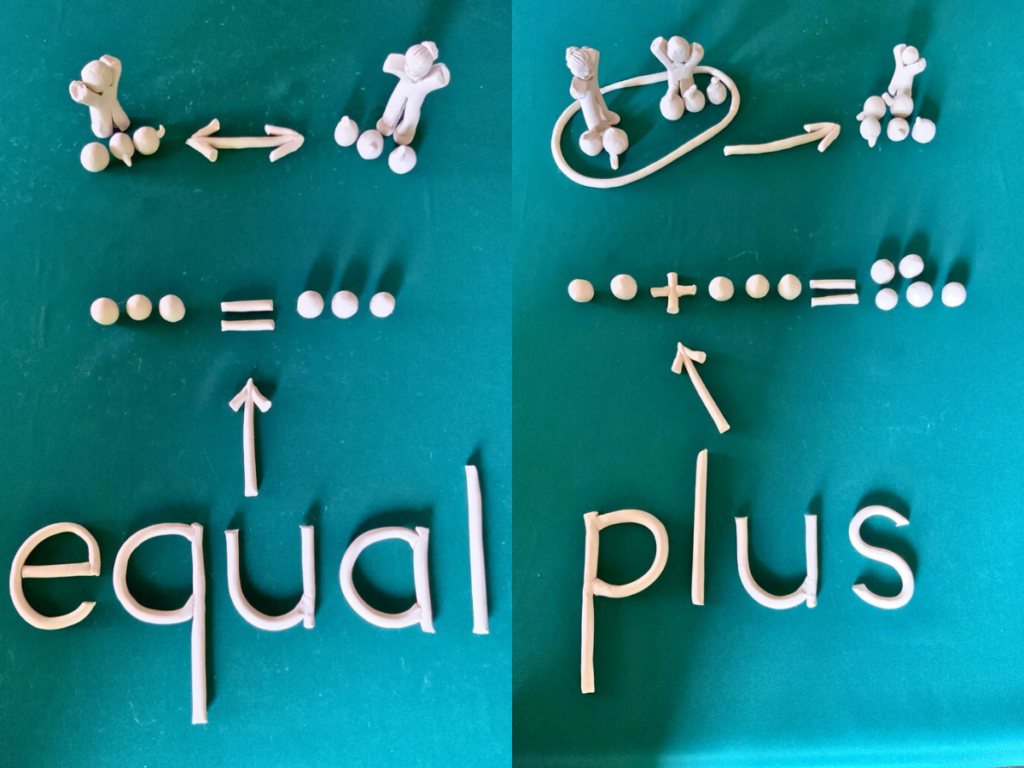
Connecting Symbols to Meaning
Mathematical symbols often confuse visual-spatial learners. Clay modeling addresses this by making abstract symbols concrete:
Where is the meaning of plus? → Point to the + sign Where is the meaning of add? → Point to the + sign
The physical model shows that different words point to the same symbol and concept.
The Summary Step
After creating the model, the learner takes control. They guide others through a summary of their clay work, pointing at the model while explaining the meaning. This active teaching role reinforces understanding and builds confidence.
Why This Approach Works
Picture-thinking learners need:
- Concrete representations of abstract concepts
- Personal context that makes learning relatable
- Multi-sensory engagement through hands-on creation
- Clear connections between different terms and symbols
- Active participation in explaining their understanding
Clay modeling provides all these elements while addressing the specific challenge of mathematical language confusion.
Beyond Addition
This approach works for all mathematical operations. Whether working with subtraction (minus, take away), multiplication (times, by), or division (divide, share), clay models help dyslexic learners understand that multiple words can represent the same mathematical concept.
The key is providing concrete, visual anchors for abstract mathematical language.
A Foundation for Success
When dyslexic children understand that mathematical terms are simply different names for the same operations, confusion decreases and confidence grows. They can focus on learning mathematics rather than decoding conflicting language.
This clarity becomes the foundation for mathematical success, allowing picture-thinking learners to engage with math using their natural strengths rather than struggling against language barriers.
Learn more about the Davis® Mastery for Dyslexia here, connect with Claire or find a Davis® Facilitator in your area.
Have questions? Contact us
When children consistently resist authority, refuse demands, or seem to oppose everything, parents and professionals often turn to labels like Oppositional Defiant Disorder (ODD) and Pathological Demand Avoidance (PDA). But what if these behaviors aren’t about defiance at all?
As both a parent of a child with ODD and PDA traits and a Davis facilitator, I’ve witnessed the complexity of supporting these children firsthand. This dual perspective has given me professional insight and deeply personal understanding of the daily challenges these families face.

The Hidden Crisis for Families
Parents of children with ODD and PDA often live in constant crisis mode, even when they don’t recognize it. The relentless cycle of conflict, avoidance, and defiance leaves families feeling powerless, isolated, and emotionally drained.
This chronic stress creates a psychological burden that:
- Undermines parental confidence
- Erodes sense of identity and stability
- Creates anticipatory anxiety around daily interactions
- Affects the entire family system
Parents function in survival mode without realizing it. This profoundly impacts their ability to support their child, themselves, and their wider family. Any effective support must address both the child’s missing conceptual foundations and the parents’ fragile emotional state.
Reframing Defiance: A Davis Perspective
The Davis approach offers a fundamental shift in understanding. Rather than viewing defiance as deliberate misbehavior, we recognize it as a child’s attempt to regain stability and control in an unpredictable world.
This reframes ODD from “willful bad behavior” to a protective strategy for children lacking internal anchors.
How the Mechanism Works
From a Davis perspective, ODD and PDA behaviors stem from disorientation — when children lack secure internal anchors like sequencing, cause and effect, time, or consequence. Without these concepts, the world feels chaotic and unpredictable, producing stress, anxiety, and helplessness.
To cope, many children create an imaginary system of control. In this inner world:
- Outcomes are predictable
- The child has agency
- They decide, protect, and control
This provides temporary stability.
The conflict emerges when external reality strips away that control. Adults set necessary rules and limits, but for children without strong cause/effect concepts, these boundaries feel arbitrary. Adult authority collides with the child’s internal script: “I am the one who decides.”
Defiance becomes self-preservation. Saying “no,” refusing, or arguing aren’t simply oppositional acts — they’re strategies to protect the inner world and ward off helplessness.
The Self-Reinforcing Cycle
This often creates a destructive pattern:
- Adults respond with sanctions or punitive language
- Children experience consequences as unjust (unable to link action and outcome)
- This confirms their belief that external reality is unfair
- Children retreat deeper into imaginary control
- Oppositional behavior strengthens
From the Davis perspective, this isn’t willful misbehavior but a protective strategy for managing overwhelming uncertainty.
Missing Conceptual Foundations
Children with ODD and PDA aren’t “choosing” defiance. Their behavior reflects gaps in essential life concepts. When these concepts are missing, rules feel random, consequences seem unfair, and relationships break down.
Key concepts that often play a role:
Change – Without it, transitions feel threatening; defiance protects against perceived instability
Cause/Effect/Consequence – Missing links make outcomes feel arbitrary; sanctions are experienced as injustice rather than learning
Before & After/Time – Weak sequencing makes requests like “homework first, then play” seem random; poor time sense fuels frustration
Order/Disorder – Structured environments feel arbitrary; chaotic ones overwhelming. Both provoke resistance
Fear – Without recognizing fear, defensive anger masks underlying anxiety
Responsibility/Control – Weakness makes self-regulation difficult; children feel controlled by others but unable to control themselves
Intention/Motivation – Misinterpreting motives creates mistrust; unclear motivation makes tasks meaningless
Energy – Difficulty pacing leads to swings between hyperactivity and exhaustion
Relationship/Trust/Agree/Rules/Belief – Missing these makes cooperation hard, rules feel unsafe, and agreement seems like submission
When these foundations are underdeveloped, the world becomes unpredictable and threatening.
Practical Davis Support Approaches
1. Building Predictability
Why it helps: Reduces anxiety around change and order
Tools: Orientation; Concept Mastery of Change, Time, Sequence and Order
Examples: Visual timetables; model “before” and “after”; practice transitions with Release and Ting to reduce stress
2. Strengthening Cause/Effect and Consequence
Why it helps: Helps children link behavior to outcomes, reducing feelings of unfairness
Tools: Concept Mastery of Cause, Effect, Consequence
Examples: Use natural demonstrations (plants growing, baking, switches) instead of punitive systems; reinforce logical links (spill water → wipe it up).
3. Developing Emotional Awareness and Regulation
Why it helps: Supports self-regulation and reduces overload
Tools: The Davis Dial; Concept Mastery of Emotions
Examples: Teach interoception cues; practice Dial adjustments in calm moments; co-regulate with Release or sensory tools
4. Offering Controlled Choices
Why it helps: Meets autonomy needs without unlimited control
Tools: Concept Mastery of Control, Want, Need
Examples: Give limited choices (“pen or pencil?” “wash up or vacuum?”); offer safe areas of full control, such as organising their desk.
5. Supporting Relationships and Rules
Why it helps: Rules make sense when grounded in trust and relationship
Tools: Symbol Mastery of Relationship, Trust, Agree, Rules
Examples: Phrase relationally (“Before coats on, after we go to the park”); co-create agreements with the child
6. Anchoring Morality in Understanding
Why it helps: Prevents rules being seen as arbitrary
Tools: Concept Mastery of Good, Bad, Right, Wrong
Examples: Use clay models to explore scenarios; reinforce mistakes as learning opportunities, not proof of being “bad.”
A New Understanding
By mapping ODD and PDA behaviors against the Davis Autism Approach® framework, we can reframe these conditions in a way that honors the child’s inner world while providing tools that anchor them more securely in reality.
Each concept mastered offers greater self-regulation, resilience, and trust in relationships.
This perspective moves us away from seeing ODD and PDA as behavioral disorders toward recognizing them as challenges of concept development and internal anchoring. With the right tools, children can gain the stability they need to thrive — without losing their creativity, individuality, or spirit.
Ask Tania anything about ODD and PDA, alongside 3 other Davis experts in Autism at our upcoming 2 day Autism weekend.
Day 1: December 6, 5:45 pm (GMT)
🎤 Dolores Gage (Madrid) – The Neurodivergent Thread: Why disorientation is the organising principle behind autism, dyslexia, and other neurodivergences — and how recognising it reveals both the challenges and the gifts of autistic thinking.
🎤 Cathie Geraci (Italy) – A powerful session on the world of non-speaking autism — how the Davis Autism Approach® helps restore calm and unlock communication.
🎤 Richard Whitehead (UK) – Ron’s Story: A first glimpse into “Dummy” — Ron Davis’s autobiographical journey from confusion to clarity, and how his discoveries became the foundation of the Davis Autism Approach®
🎤 Melanie Curry (New Zealand) – Missing Concepts and Individuation — Exploring the essential developmental concepts that underpin self-awareness, presence, and connection — and what happens when they’re missing.
Day 2: December 7, 8:30 pm (GMT)
Panel of Facilitators + Live Q&A — Tania Blackmore-Squires, Axel Gudmundsson, Mary Martin, Danette Moriarty
Real stories from Davis Autism Facilitators — how individuals and families are using the Davis tools to create life-changing progress. Includes open Q&A.
Have questions? Contact us
Fout: Contact formulier niet gevonden.
The Davis Method’s global reach expanded significantly in August 2025 when Davis UK & Ireland partnered with Dyslexia Tanzania to host two groundbreaking “Ask a Davis Expert” sessions. These live Zoom Q&A events brought together parents, educators, and neurodivergent adults seeking practical guidance grounded in the Davis approach.
The response exceeded all expectations.
First Session Sets the Standard
The inaugural session on August 5th drew strong attendance and lively engagement from across Tanzania. Three experts led the discussion:
- Richard Whitehead – Director of Davis UK & Ireland
- Rahma Amer Mbarak – Tanzania’s sole Davis Facilitator
- Caudence Ayoti – Founder of Dyslexia Tanzania
Questions flowed freely on topics including dyslexia, dyscalculia, ADHD, autism, and how Davis programmes can adapt to the Tanzanian context. Participants showed genuine hunger for information about alternative approaches to neurodiversity support.
The enthusiasm was so overwhelming that organizers immediately scheduled a follow-up session.
International Expertise Joins the Conversation
The second session on August 12th featured international Davis neurodiversity expert Cathie Geraci. While attendance was smaller, the quality of discussion remained high.
Participants showed particular interest in Davis solutions for non-speaking learners with autism. The demand for this specialized knowledge was so strong that Cathie committed to returning for a dedicated session planned for after mid-September.
The Heart of the Partnership
These events represent more than just information sharing. They mark the beginning of a purposeful collaboration between Davis UK & Ireland and Dyslexia Tanzania, with Rahma Amer Mbarak at the center.
Rahma’s unique position makes this partnership particularly powerful:
- Licensed Davis Facilitator and Davis Hub Member
- Board member of Dyslexia Tanzania
- Cultural bridge between international expertise and local needs
Her passion, credibility, and cultural grounding transformed this initiative from possibility into impact.
Building for the Future
The success of these initial sessions has sparked ambitious plans for expansion:
- Training Access – Discussions are underway to improve training opportunities for aspiring Davis Facilitators in Tanzania
- School Outreach – Targeted programmes for educational institutions are being developed
- Government Engagement – Plans include outreach to government SEN departments
- Ongoing Support – Regular expert sessions will continue to serve the growing community
Why This Matters
Tanzania’s neurodivergent population has historically had limited access to specialized support. Traditional approaches often don’t account for cultural context or local resources. The Davis Method’s focus on strengths-based, individualized support translates well across cultures.
These sessions demonstrate that geographic barriers don’t have to limit access to quality neurodiversity support. When passionate advocates like Rahma and Caudence connect with international expertise, real change becomes possible.
Recognition and Gratitude
The initiative’s success reflects the generous collaboration of all involved. Special recognition goes to Caudence Ayoti for her open and generous approach to partnerships of this kind. Her leadership at Dyslexia Tanzania created the foundation for this meaningful connection.
The willingness of Davis UK & Ireland experts to share their knowledge freely demonstrates the broader Davis community’s commitment to global accessibility.
Looking Ahead
These two sessions represent just the beginning. The momentum generated points toward a sustainable model for international Davis Method support that could extend well beyond Tanzania.
As discussions continue about expanded programming and training opportunities, one thing is clear: the appetite for alternative approaches to neurodiversity support exists worldwide. The challenge is creating sustainable ways to meet that demand.
The Tanzania partnership provides a promising template for how international collaboration can bridge expertise gaps while respecting local knowledge and cultural context.
The Davis UK & Ireland hub is dedicated to growing connections in Tanzania and beyond. Find out more about their programmes and partnerships at www.davismethod.co.uk.
Kuimarisha Uhusiano wa Kimataifa: Vipindi Viwili vya “Uliza Mtaalamu wa Davis” Vyachochea Mwitikio Tanzania
Mwezi Agosti 2025, Davis UK & Ireland iliungana na Dyslexia Tanzania kuandaa vipindi viwili vya moja kwa moja vya Uliza Mtaalamu wa Davis vilivyolengwa mahsusi kwa hadhira ya Kitanzania. Vipindi hivi vya wazi vya maswali na majibu kupitia Zoom viliwaleta pamoja wazazi, walimu, na watu wazima wenye utofauti wa neva waliokuwa wakitafuta mwongozo wa vitendo na majibu yanayotokana na mbinu za Davis.
Kipindi cha kwanza, kilichofanyika tarehe 5 Agosti, kilizidi matarajio kwa mahudhurio makubwa na ushiriki hai. Kikao hicho kiliongozwa na: Richard Whitehead, Mkurugenzi wa Davis UK & Ireland; Rahma Amer Mbarak, ambaye kwa sasa ndiye Fasiliteta pekee wa Davis nchini Tanzania; na Caudence Ayoti, Mwanzilishi wa Dyslexia Tanzania.
Maswali yalihusu mada mbalimbali zikiwemo dyslexia, dyscalculia, ADHD, autism, na jinsi programu za Davis zinavyoweza kubadilishwa ili kufaa mazingira ya Tanzania. Mwitikio ulikuwa wa kusisimua kiasi kwamba kipindi cha pili kilipangwa wiki iliyofuata, tarehe 12 Agosti — safari hii kikimshirikisha Cathie Geraci, mtaalamu wa kimataifa wa utofauti wa ujifunzaji kupitia mbinu za Davis.
Ingawa kikao cha pili kilikuwa na mahudhurio ya chini kidogo, kiwango cha maswali na mjadala kilikuwa cha juu. Washiriki walionyesha hamu kubwa ya kupata suluhisho la Davis kwa wanafunzi wasiozungumza (non-verbal) wenye autism — mada ambayo Cathie atarudi kuijadili katika kikao kingine kinachopangwa kufanyika baada ya katikati ya mwezi Septemba.
Ushirikiano Unaokua
Matukio haya yanaashiria mwanzo wa ushirikiano wenye matumaini na malengo mahususi kati ya Davis UK & Ireland na Dyslexia Tanzania, huku Rahma Amer Mbarak akiwa kiini cha ushirikiano huu. Rahma anashikilia nafasi muhimu katika mashirika haya yote mawili — kama Fasiliteta aliyeidhinishwa wa Davis, mwanachama wa Hub ya Davis, na mjumbe wa bodi ya Dyslexia Tanzania. Shauku yake, uaminifu wake, na uelewa wake wa kiutamaduni ndivyo vimefanya mpango huu kufanikiwa kwa namna ya kipekee.
Majadiliano sasa yanaendelea ili kuandaa matukio zaidi, kuboresha upatikanaji wa mafunzo kwa Watanzania wanaotamani kuwa Wafasiliteta wa Davis, na kuanzisha programu za uwamsho katika shule na idara za serikali za elimu maalum (SEN). Tunafurahishwa sana na maendeleo haya, na tunamshukuru kwa dhati Caudence Ayoti kwa mtazamo wake wa wazi na ukarimu katika kushirikiana kwenye miradi ya aina hii.
The Davis UK & Ireland hub is dedicated to growing connections in Tanzania and beyond. Find out more about their programmes and partnerships at www.davismethod.co.uk.
Guest Post by Stephen Martin
Stephen Martin is a leading voice in the adult dyslexia and ADHD space, best known as the host of The Truth About Dyslexia podcast — a raw, real, and relatable show that’s reached over 1 million downloads. Diagnosed with dyslexia as a child, Stephen now uses his lived experience and deep curiosity to empower neurodivergent adults through coaching, storytelling, and practical tools that actually work. He’s the founder of Truth About Dyslexia Coaching, where he helps adults shift from confusion to clarity using strategies tailored to the dyslexic mind.

Let’s talk about time. ⏳
Because if you don’t get time right, everything else starts falling apart.
I’m not just talking about being late to a meeting or missing a birthday. I’m talking about the way time can feel bent, malleable, or straight-up invisible when you’re dyslexic.
If you’ve lived with dyslexia or worked with adults who have, you’ll know exactly what I mean. Time is one of those invisible concepts we’re supposed to just get. But many of us don’t. And no one ever taught us how.
Time Isn’t a Straight Line for Us
For most people, time moves in a straight line. 10:00 am leads to 11:00 am leads to 12:00 pm. It’s structured, segmented, and measurable.
But for the neurodiverse brain? It’s not that simple.
I remember catching up with a friend recently. I could have sworn I’d seen her just a couple of weeks ago. She laughed and said, “Stephen, it’s been six months.”
And I believed her. But it still felt like two weeks in my head.
I’ve had business projects I thought would take six months, and 18 months later, I’m still knee-deep in them. I wasn’t being lazy. I wasn’t overpromising. I genuinely thought I’d nailed the timeline.
And that’s the challenge. Our brains can see the finished picture — vivid, clear, exciting — but that mental image doesn’t come with a realistic sense of how long it takes to build in the real world.
We see the vision. But we skip the ruler.

The Real Problem: We Feel Broken
If you’ve been told all your life that time management is a “basic skill,” and you can’t seem to nail it, you start to feel broken. You start saying things like:
• “I’m terrible with time.”
• “I’m just not organised.”
• “Why do I always underestimate everything?”
But what if it’s not that you’re broken… What if your concept of time was never properly developed?
That’s what I learnt when I did the Davis® Concepts for Life program. (Which, let’s be honest, should really be called the Davis Life Concepts for Humans — because it’s powerful for anyone neurodiverse.)
This was the first time someone had taken the abstract idea of “time” and actually helped me build it in 3D.
The Davis Way of Teaching Time
I don’t know about you, but I’ve read plenty of books about managing time. Some were helpful. Most weren’t. I’d remember one or two tips — maybe something like “use a timer” or “break tasks into chunks” — but the rest? Gone.
What Davis did differently was this: they didn’t just tell me about time… they made me experience it.
In the course, we looked at time not as a clock, but as a concept. A structure. A ruler for life.
Through the clay work and exercises, I wasn’t just learning time — I was building it, piece by piece, in a way that made sense to my dyslexic brain.
Suddenly, time wasn’t abstract anymore. It had form. It had weight. It had meaning.
And that meant I could use it.
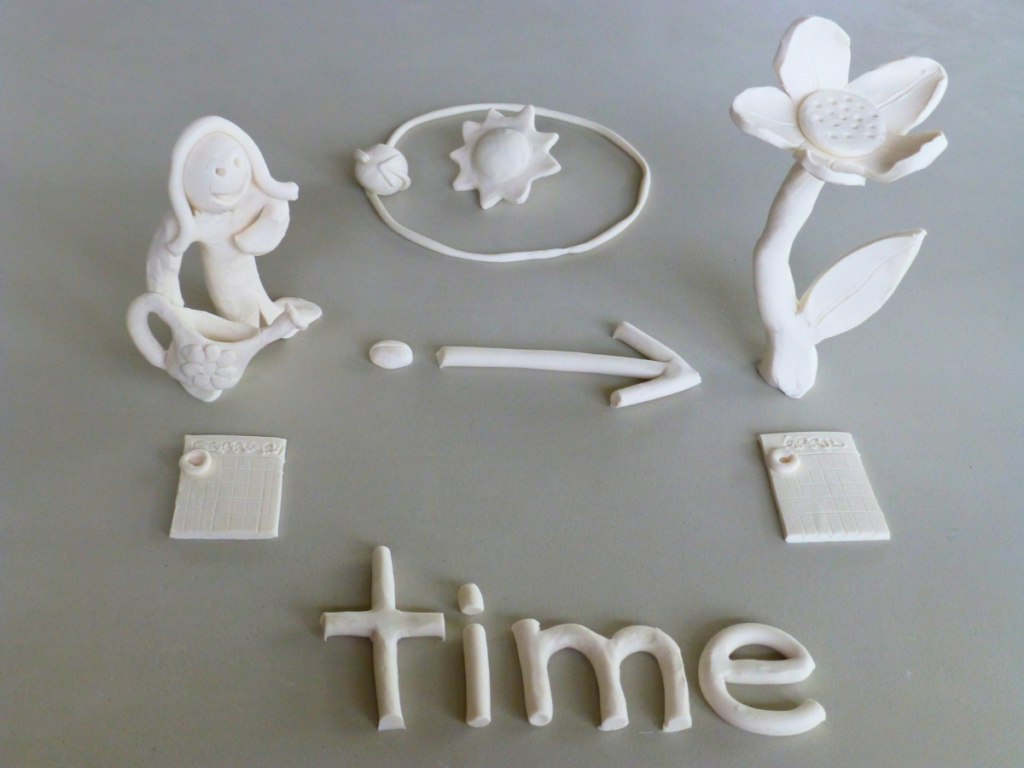
Why It Works for Dyslexic Adults
Most of us didn’t learn this stuff as kids. We just got told off for being late or unrealistic or “away with the fairies.”
But Davis doesn’t shame you. It shows you.
And here’s the kicker. Once you “get” time — not just as a word or number but as a functioning life tool — your whole life starts to shift.
• You stop overcommitting
• You stop underestimating
• You start finishing things you start
• You feel less guilty and more grounded
It doesn’t mean you suddenly become super rigid or perfectly punctual. I still work with my natural rhythms. But it gives you the structure to make real choices about how you spend your energy.
It’s Not Just About Productivity
Let’s be real. Time isn’t just about “getting stuff done.”
When you don’t understand time, you don’t understand rest either.
You might lie on the couch for three hours scrolling TikTok and then wonder why you still feel fried.
Understanding time helps you recover, not just schedule. It helps you regulate. It helps you get your needs met, especially if you’re juggling dyslexia, ADHD, anxiety, or the cocktail of neurodiverse companions many of us carry.
Time is not just a ticking clock. It’s a container for your life. And if that container is cracked or fuzzy or invisible… everything leaks.
What I’d Say to Facilitators Reading This
If you’re a Davis facilitator then thank you. Honestly. You’re doing the work most people don’t even realise is needed.
If you’re working with adults especially, don’t skip the concept of time. It can be a game-changer. It’s not just for people with time blindness. It’s for anyone who struggles to bring their internal visions into external reality.
Time is the bridge between the picture in your head and the life you want to live.
And the way Davis teaches it? It sticks. It lands. It lasts. 🙌
Want More?
Stephen Martin runs The Truth About Dyslexia, one of the top adult dyslexia podcasts in the world, with over 1 million downloads and counting.
If you’re looking for honest stories, neurodiverse hacks, and the kind of truth they never taught you in school, it’s worth a listen.
🎧 Listen here: Dyslexia Podcast
Or search The Truth About Dyslexia wherever you get your podcasts.
He’s also created a support space for dyslexic and ADHD adults called the Right Brain Reset. It’s a private community for people who want to make progress without burning out.
🧠 Learn more about ther Right Brain Reset Here
If you’re dyslexic and tired of doing it all alone, this might be the space you’ve been missing.
Want to know more about the Davis® Concepts for Life Program?
Find a Licensed Davis® Facilitator in your area or learn more about the program here. If you are unsure whether the Davis Concepts for Life program is right for you or someone you support, fill out the form below for a free Discovery Call – one of our team will speak with you about your specific needs.
Fout: Contact formulier niet gevonden.
After years of struggling with traditional executive function strategies that promised change but delivered frustration, many neurodivergent individuals and their families have discovered an approach that truly creates lasting transformation by addressing the root causes of executive function challenges.
The Davis Method represents a fundamental shift in how we understand and support executive function difficulties. Instead of managing symptoms with external tools and behavioral modifications, this approach builds the conceptual foundation that makes strong executive functioning possible.
The Davis Difference
The Davis Method was developed by Ron Davis, who experienced severe dyslexia and autism himself and understood from personal experience that learning differences stem from how the brain processes information. His breakthrough insight was that many learning and attention challenges arise from confusion about abstract concepts that most educational approaches assume people automatically understand.
When applied to executive function challenges, this insight reveals why so many traditional strategies fail: they’re built on assumptions about conceptual understanding that may not exist for individuals.

The Foundation of Executive Function – Abstract Concepts
At the heart of executive function lie several abstract and foundational concepts that most people take for granted:
Time: This is not about reading a clock, but truly understanding what time means, how it flows, and how to sense its passage.
Sequence: Understanding different types of sequences, what comes before and after, and how steps build upon each other, in order to prioritize and plan.
Cause and Effect: Grasping the relationship between actions and outcomes – positive and negative.
Order vs. Disorder: Recognizing patterns, understanding organization, and knowing how to create ‘order’ in different aspects of life.
Responsibility: Understanding the components that need to be present within self, in order to be able to take responsibility.
For many neurodivergent individuals, these concepts remain partially understood or completely confusing, despite being able to define them verbally. This gap between intellectual knowledge and true understanding creates the foundation for executive function struggles.

Making the Abstract Concrete with Clay
The Davis Method uses clay modeling to help individuals create concrete representations of abstract concepts. This hands-on approach allows people to literally build their understanding of time, sequence, cause and effect, and other foundational concepts.
Why clay? Because it engages multiple senses, allows for three-dimensional exploration, and enables people to manipulate and adjust their understanding until concepts become clear. For visual-spatial thinkers especially, this approach transforms confusing abstractions into tangible, understandable realities.
Stephen Martin, host of The Truth About Dyslexia podcast, describes his experience: “It felt like rewiring parts of my brain that had been running on guesswork for years. The clay work helped me understand concepts I thought I already knew but had never truly internalized.”

The Davis Concepts for Life Program: Individual Transformation
The Davis Concepts for Life Program provides intensive, one-on-one work with a trained Davis facilitator. Over the course of this individualized program, participants:
- Work through all of the Davis foundational concepts using clay modeling and hands-on learning
- Develop personalized tools for self-regulation and focus
- Practice applying new understanding to real-world situations
- Build lasting skills that support executive function across all areas of life
This individualized approach allows for complete customization to each person’s learning style, processing preferences, and specific goals and challenges.
The Davis Concepts for Life Workshop: Learning to Support Others
The Davis Concepts for Life Workshop teaches parents, professionals, and neurodivergent individuals themselves how to facilitate this transformational process for others, or to better understand themselves.
Over five intensive days, workshop participants learn:
- How to identify conceptual confusion underlying executive function challenges
- Clay modeling techniques for teaching abstract concepts
- Tools for supporting self-regulation, stress management, and energy regulation
- Strategies for building lasting organizational and planning skills
- How to create environments that support neurodivergent success
This workshop empowers attendees to become agents of change in their families, classrooms, or therapeutic practices.
Why the Davis Method Works When Others Don’t
Addresses Root Causes: Instead of managing symptoms, the Davis Method builds the conceptual foundation that supports natural executive functioning.
Works with Neurodivergent Strengths: The visual-spatial, hands-on approach aligns with how many neurodivergent brains naturally process information.
Creates Lasting Change: Once someone truly understands foundational concepts, they don’t need to rely on external supports—the skills become internalized.
Reduces Mental Load: Rather than adding more systems to remember and maintain, this approach eliminates the confusion that was creating executive function struggles in the first place.
Individualized and Flexible: The method adapts to each person’s unique processing style and learning needs.
What Participants Experience
Families and individuals who have experienced the Davis Concepts for Life program or workshop report:
- Improved time awareness and management without constant reminders
- Better emotional regulation during stressful or unexpected situations
- Increased ability to organize thoughts, belongings, and priorities naturally
- Enhanced planning and follow-through on tasks and goals
- Reduced anxiety around transitions and changes in routine
- Greater self-confidence and stronger boundaries
- Increased cognitive flexibility

Is the Davis Method Right for You?
The Davis Concepts for Life is particularly effective for individuals who:
- Have tried traditional executive function strategies without lasting success
- Are visual-spatial thinkers who learn better through hands-on experiences
- Experience executive function challenges alongside conditions like ADHD, autism, or dyslexia
- Feel exhausted by constantly managing external organizational systems
- Want to build foundational skills rather than just cope with symptoms
Your Path Forward
Whether you’re recognizing executive function challenges in yourself or someone you care about, we offer multiple pathways designed to meet different needs:
Want to Learn More First? Watch the replay of our webinar “Beyond the Struggle: Demystifying Executive Function for Neurodivergent Minds” featuring Mary Martin, Melanie Curry, Anne Mataczynski, and Anna Berghamre for additional insights before choosing your path forward. BONUS! Get our Free Executive Function Challenges Checklist to identify exactly where the gaps might be.
Individual Support: Work one-on-one with a trained Davis facilitator through the Davis Concepts for Life Program for personalized, intensive skill building. Find a Facilitator near you Facilitators Archive – Davis – English
Learn to Support Others (or Yourself): Join our Davis Concepts for Life Workshop to learn these life-changing techniques for your family, students, or clients.
The Time for Real Change is Now
Executive function challenges don’t have to be a lifelong struggle managed through external systems and constant effort. The Davis Method offers a path to genuine transformation—one that builds from the ground up and creates lasting change by addressing the foundational concepts that support natural executive functioning.
If you’re ready to move beyond managing symptoms and start building real skills, we invite you to discover how the Davis Method can transform executive function challenges into strengths.
The journey to clearer thinking, better organization, and greater self-confidence begins with understanding. And understanding begins with the right approach.
Read post 2 in this series: The Davis Method: A Different Approach to Executive Function Challenges→
Want to book a Discovery call with us? Fill out the form below
Fout: Contact formulier niet gevonden.
You’ve probably tried them all: color-coded planners, phone alerts, reward charts, breaking tasks into smaller steps, and countless apps promising to revolutionize your organization. Yet somehow, you’re still struggling with the same executive function challenges. Sound familiar?
If you’re neurodivergent, whether you have ADHD, autism, dyslexia, or simply a brain that works differently, you’ve likely discovered that traditional executive function strategies often fall short. But it’s not because you’re doing something wrong. The problem lies in how these strategies are designed.
The One-Size-Fits-All Problem
Most executive function interventions are designed for neurotypical brains. They assume that everyone processes information, manages attention, and regulates emotions in similar ways. But neurodivergent brains operate with different strengths, challenges, and processing styles.
Consider the common advice to “use a planner.” For someone with ADHD, the planner might become another source of overwhelm rather than organization. For an autistic individual, rigid planning systems might increase anxiety when unexpected changes occur. For someone with dyslexia, traditional written planning methods might not align with their visual-spatial strengths.

Surface Solutions for Deep Challenges
Traditional approaches typically focus on external supports and behavioral modifications—essentially trying to patch over executive function difficulties without addressing their root causes.
What traditional strategies look like:
- Time management apps and reminder systems
- Breaking large tasks into smaller steps
- Color-coding and visual organization systems
- Reward and consequence charts
- Mindfulness and meditation practices
- Cognitive behavioral therapy techniques
While these tools can provide temporary relief, they often fail to create lasting change because they don’t address the fundamental issue: difficulty understanding and internalizing abstract concepts that form the foundation of executive functioning.
The Abstract Concept Gap
Here’s what many professionals don’t realize: executive function challenges often stem from lack of clarity around abstract concepts like time, sequence, cause and effect, order, and responsibility.
For example, telling someone to “manage their time better” assumes they have a clear, internalized understanding of what time is and an accurate perception of the passage of time. But for many neurodivergent individuals, time remains an abstract, confusing concept. They might intellectually know that an hour has 60 minutes, but they lack the accurate experience of time that makes effective time management possible.
Similarly, consequences and rewards systems assume someone truly understands cause and effect relationships. Without this foundational understanding, external behaviour modification techniques often feel arbitrary and fail to create meaningful change.
Why Neurodivergent Brains Need Different Approaches
Different Processing Styles: Neurodivergent brains often process information in unique ways. Visual thinkers might struggle with purely verbal instructions, while those with working memory challenges need different approaches than those with attention regulation difficulties.
Sensory Considerations: Many neurodivergent individuals have sensory processing differences that can impact executive functioning. Traditional strategies rarely account for how sensory overwhelm or seeking behaviors affect organization and planning abilities.
Motivation and Interest: Neurodivergent brains often have different motivation patterns. What works as a reward or consequence for neurotypical individuals might not resonate with someone whose brain operates differently.
Masking and Compensation: Many neurodivergent individuals become skilled at masking their difficulties or developing elaborate compensation strategies. Traditional approaches might reinforce these exhausting patterns rather than addressing underlying challenges.

The Fatigue Factor
Perhaps most importantly, traditional executive function strategies often increase rather than decrease mental load. When you’re constantly relying on external systems, reminder alerts, and complex organizational schemes, you’re using enormous amounts of mental energy that could be directed elsewhere.
Many neurodivergent individuals report feeling exhausted by the end of the day, not from their actual work or activities, but from the constant effort required to navigate systems that don’t match how their brains naturally function.
What Neurodivergent Brains Actually Need
Instead of more external supports and behavioral modifications, neurodivergent brains often need:
Conceptual Understanding: Deep, internalized understanding of specific concepts that support executive functioning, rather than surface-level strategies.
Individualized Approaches: Solutions that work with, rather than against, natural processing styles and strengths.
Foundation Building: Addressing root causes rather than managing symptoms.
Simple self-regulation tools: Effective techniques that are quick and easy to use in any situation to ensure focus, stress management and energy regulation.
Sustainable Strategies: Approaches that reduce rather than increase mental load over time that remain meaningful and useable.
The Davis Concepts for Life Program provides one-on-one support and was developed specifically to address these needs, using hands-on learning techniques that help individuals truly understand and internalize the concepts that support strong executive functioning.
Moving Beyond Band-Aid Solutions
If you’ve been frustrated by traditional executive function strategies, know that it’s not a reflection of your effort or ability. You simply need an approach that’s designed for how your brain actually works.
The Davis Concepts for Life Workshop supports parents, professionals, teachers, and support workers—to facilitate this transformation process for others. It is also life changing for individuals to attend who are struggling with executive function. Whether you’re supporting someone you care about or seeking tools for your own executive function challenges, by the end of this workshop you’ll have the skills to guide someone through nearly 50 key concepts and 3 simple self-regulation tools that form the foundation of strong executive functioning.
Ready for a Different Approach?
Join hundreds who’ve watched our expert panel on executive functioning. Get the replay plus our comprehensive assessment checklist – both free for a limited time. Watch now→
Join us for upcoming workshops where you’ll learn why the Davis Method succeeds where traditional approaches often fall short.
In our final post of this series, we’ll explore exactly how the Davis Method creates lasting change by addressing the foundational concepts that support strong executive functioning—and why this approach is revolutionizing how we understand and support neurodivergent brains.
←Read previous: Understanding Executive Function: The Brain’s CEO That Controls Your Daily Life
Read next: The Davis Method: A Different Approach to Executive Function Challenges→
Have questions? Contact us
Fout: Contact formulier niet gevonden.

Executive function might sound like corporate jargon, but it’s actually one of the most crucial aspects of how your brain operates daily. Think of it as your brain’s “CEO”—the system that manages planning, organizing, focusing, and regulating emotions. When these skills work smoothly, life feels manageable. But when executive function struggles emerge, even simple tasks can become overwhelming sources of stress and frustration.
Want to know more about how executive function can affect daily life? Watch the replay of our webinar “Beyond the Struggle: Demystifying Executive Function for Neurodivergent Minds” featuring Mary Martin, Melanie Curry, Anne Mataczynski, and Anna Berghamre for additional insights before choosing your path forward. BONUS! Get our Free Executive Function Challenges Checklist to identify exactly where the gaps might be.
What is the Best Definition of Executive Function?
Executive function refers to a set of mental skills that include working memory, flexible thinking, and self-control. These skills help us focus attention, remember instructions, juggle multiple tasks successfully, and regulate our emotions and behaviour. Essentially, executive function is what allows us to plan ahead, stay organized, and adapt when things don’t go as expected.
The Three Main Components of Executive Function
Understanding executive function becomes clearer when we break it down into its three core components:
Working Memory
Working memory is your brain’s ability to hold information front of mind while using it. It’s what allows you to remember a phone number long enough to dial it, or follow multi-step instructions without losing track. When working memory struggles, people might forget what they were doing mid-task or lose track of important details.
Mental Flexibility (Cognitive Flexibility)
This is your brain’s ability to switch between thinking about different concepts or adapt when rules change. Mental flexibility helps you transition from one activity to another, see problems from different angles, and adjust when unexpected changes occur. Without it, people may get “stuck” in routines or have difficulty when plans change unexpectedly.
Inhibitory Control (Self-Control)
Inhibitory control helps you resist impulses, stay focused, and think before acting. It’s what stops you from interrupting others, helps you stick to a task even when it’s boring, and allows you to consider consequences before making decisions. When this system struggles, people may act impulsively or have difficulty controlling their emotional responses.
Why Are Your Executive Functions So Important?
Executive functions are foundational skills that make everything else possible. They’re what allow you to:
- Complete tasks from start to finish
- Manage time effectively
- Organize your thoughts, belongings, and priorities
- Control your emotions during stressful situations
- Make plans and follow through with them
- Learn from mistakes and adjust your approach
Without strong executive function skills, daily life becomes an uphill battle. Work projects remain unfinished, relationships suffer from emotional outbursts, and the constant struggle to stay organized creates ongoing stress and anxiety.

What Causes Poor Executive Functioning?
Poor executive functioning can stem from various factors:
Neurological Differences: Different learning styles (picture thinkers), neurodivergent brains, ADHD, autism and dyslexia often involve executive function challenges. The regions of the brain responsible for these skills may develop differently or function in unique ways for neurodiverse individuals.
Brain Injury or Trauma: Traumatic brain injuries, strokes, or other brain-related medical conditions can impact executive function abilities.
Stress and Mental Health: Chronic stress, anxiety, depression, and trauma can significantly impact executive functioning, making it harder to focus, plan, and regulate emotions.
Developmental Factors: Some people may not have had opportunities to develop strong executive function skills during childhood, or may have missed learning key foundational concepts that support these abilities.
Is Poor Executive Function ADHD? Autism? Or Something Else?
This is a common source of confusion. Poor executive function isn’t a diagnosis itself—it’s a characteristic that can appear across many different neuro-types:
- ADHD frequently involves executive function challenges, particularly with attention, impulse control, and working memory
- Autism often includes executive function differences, especially around mental flexibility and transitions
- Dyslexia can involve working memory and organizational challenges
- Anxiety disorders can significantly impact executive functioning abilities
- Learning disabilities often co-occur with executive function struggles
However, executive function challenges can also exist independently without a formal diagnosis. Some people simply have brains that work differently and need targeted support to develop these crucial skills.
How Do You Fix Poor Executive Function?
The good news is that executive function skills can be improved, but the approach matters significantly. Traditional strategies often focus on external supports and behavioural modifications – things like planners, reminder systems, and time management techniques.
While these tools can be helpful, they don’t address the underlying issue: difficulty with abstract concepts that form the foundation of executive functioning.
The Davis Concepts for Life Program takes a different approach by helping individuals truly understand and internalize abstract concepts like time, sequence, cause and effect, and responsibility. Using hands-on, clay-based learning techniques, people develop a solid conceptual foundation that supports lasting executive function improvements.
Can Executive Functioning Skills Be Taught?
Absolutely! Executive functioning skills can be taught and strengthened at any age. However, the most effective approaches go beyond surface-level strategies to address the foundational concepts that support these skills.
The Davis Concepts for Life Workshop teaches parents, professionals, teachers, and support workers—as well as individuals struggling with executive function themselves—how to build these foundational skills using proven techniques that make abstract concepts concrete and understandable. Whether you’re supporting someone you care about or seeking tools for your own executive function challenges, by the end of this workshop you’ll have the skills to guide someone through nearly 50 abstract concepts that form the foundation of strong executive functioning.
Read the next post in this series: Why Traditional Executive Function Strategies Don’t Work for Neurodivergent Brains
Ready to Dive Deeper?
Now that you understand what executive function is and why it’s so crucial for daily life, you might be wondering: “What does this look like in real life, and how can it be addressed?”
We recently hosted an expert panel discussion where licensed Davis facilitators explored these exact questions. You’ll discover:
- How to distinguish between normal behavior and actual executive functioning challenges
- Why neurodivergent brains struggle with tasks that seem “simple” to others
- Real success stories from families who’ve found lasting solutions
- How the Davis approach differs from traditional strategies
Watch the replay now and get our FREE Executive Function Challenges Checklist – a comprehensive tool to help you identify specific areas where you or your loved one might need support.
Have questions? Contact us
Fout: Contact formulier niet gevonden.
Guest post by Stephen Martin, The Truth About Dyslexia Podcast, New Zealand
Why you’re not broken, and how Davis helped me finally get it.
Ever been told a word and just… snapped?
Not because the word was rude.
But because your brain went “What the heck does that even mean?”
And suddenly your whole nervous system feels like it’s on fire?
Welcome to the world of dyslexia and trigger words.
But here’s the twist,
When Ron Davis talks about trigger words, he’s not talking about emotional triggers.
He’s talking about non-picture words.
Words like:
the, if, was, because, even, though, should, could, would.
Words that don’t have a picture in your mind.
And if you’re a dyslexic thinker who processes through images and visuals…
That’s like asking your brain to solve a puzzle with half the pieces missing.
These are the real “trigger” words.
They don’t just confuse us, they disorient us.
We might be reading a sentence fine, then hit one of these invisible words and
💥 Boom, brain fog, misreading, skipping lines, mental exhaustion.
It’s like our brain steps out of sync with reality.
And the worst part?
We blame ourselves.

“Just focus.” Yeah, right.
For years I thought I was lazy.
I heard “just try harder” and “you’re not paying attention” more times than I can count.
But what I’ve come to learn, through the Davis Dyslexia Method, is that my brain was trying.
It just didn’t have the right tools.
Davis gave me a map.
It helped me understand disorientation, that moment where your sense of time, space and meaning twists up.
It’s not you being “bad at reading”, it’s your brain spinning because it’s trying to make sense of a word it can’t picture.
And here’s the kicker,
When you learn how to orient yourself, things start to click.
Reading becomes clearer.
Thinking becomes calmer.
Life starts making more sense.
Dyslexia isn’t a solo act.
Here’s the thing no one told us growing up,
Dyslexia often brings friends.
ADHD, Autism, Anxiety, Emotional storms.
They’re branches of the same neurodiverse tree.
And guess what? The Davis tools can help there too.
For me, the Life Concepts course was a lifeline.
The Attention Mastery program could be helpful for many too.
You’re not broken. You were never taught the rules.
So if you’ve ever felt:
• Like your brain switches off mid-sentence
• Like a simple word trips you up
• Like you “should” be better at this by now…
Please hear this:
You’re not overreacting.
You’re running a powerful brain, without the manual.
There’s a better way.
And the Davis approach changed everything for me.
Want to know more?
✅ Take the Dyslexia Quiz — quick and eye-opening
🎧 Check out my Truth About Dyslexia podcast, raw, honest, and all the things school never taught us
📚 Read The Gift of Dyslexia by Ron Davis, it’s a game changer
P.S. If you’ve ever blamed yourself for being confused by “the” or “was”… you’re not alone. You’re dyslexic. And that’s nothing to be ashamed of.
Inspired by Stephen’s story?
If you’re an adult looking for support, you can find a Davis Facilitator near you and explore how the Davis Concepts for Life® program or Davis Mastery for Dyslexia program could help you or someone you care about.
Or, if you’d like to guide someone through the program yourself — and even take the first step toward becoming a Licensed Davis Facilitator — join an upcoming Concepts for Life Workshop or upcoming Gift of Dyslexia Workshop to gain the tools and training to make a real difference.
About the Author: Stephen Martin
Stephen Martin is a leading voice in the adult dyslexia and ADHD space, best known as the host of The Truth About Dyslexia podcast — a raw, real, and relatable show that’s reached over 1 million downloads. Diagnosed with dyslexia as a child, Stephen now uses his lived experience and deep curiosity to empower neurodivergent adults through coaching, storytelling, and practical tools that actually work. He’s the founder of Truth About Dyslexia Coaching, where he helps adults shift from confusion to clarity using strategies tailored to the dyslexic mind.

Story by Theano Panagiotopoulou – Davis Facilitator, Αθήνα, ΑΤΤΙΚΗ, Greece
Client age: 26 years old
Profession: Environmental Scientist
K.D. had been diagnosed as dyslexic, with dyscalculia and attention deficit from the age of third grade elementary. Her memories during her school life are characterized by an intense feeling of failure. Being fired from her first job was the catalyst for her decision to attend the Davis Dyslexia program.
Her goal was one: “to see what I read.”
During the program we addressed the full spectrum of dyslexia and everything it contains in terms of emotions and fears. When she heard the word “reading” she felt fear and shame. As soon as K.D. received the alignment tool, she immediately said she felt “certainty.” With the koosh balls she was impressed that she could maintain her balance, catch the balls and not become disoriented. When we finished the program, in evaluating the results she said the characteristic phrase: “I don’t know if I’ll manage to work properly, but my feeling is that it was like I was drunk and someone gave me coffee to drink.”
We met with Despina one month after the program and I observed the following important points:
- She did the mastery program EVERY DAY
- She improved her handwriting tremendously
- She considered that she was between 2 worlds (the old and new self)
- She decided to study her aerial photography course, which she was AFRAID to even touch because she didn’t understand it at all, and she found that she no longer had this difficulty. On the contrary, she could completely understand what she was reading.
- She sent an email without checking it “thousands of times” because she was confident about what she had written
She continues her training. She got a job a month ago. She feels confident and secure. All this change is also intensely visible in her presence – “she has become more beautiful.”
🇬🇷 Greek:
Ηλικία : 26 ετών Επάγγελμα : Περιβαλλοντολόγος Η Κ.Δ. είχε διαγνωσθεί ως δυσλεξική, με δυσαριθμησία και διάσπαση προσοχής από την ηλικία της Τρίτης Δημοτικού. Οι αναμνήσεις της κατά την διάρκεια της σχολικής ζωής της χαρακτηρίζονται από ένα έντονο συναίσθημα αποτυχίας. Η απόλυσή της από την πρώτη της δουλειά ήταν η αφορμή να αποφασίσει να παρακολουθήσει το πρόγραμμα της Δυσλεξίας Davis.
Ο στόχος της ήταν ένας: «να βλέπω αυτό που διαβάζω».
Κατά την διάρκεια του προγράμματος αντιμετωπίσαμε όλο το φάσμα της δυσλεξίας και ό,τι αυτό περιέχει σε συναισθήματα και φόβους. Όταν άκουγε την λέξη «ανάγνωση» αισθανόταν φόβο και ντροπή. Μόλις η Κ.Δ. πήρε το εργαλείο της ευθυγράμμισης, είπε αμέσως ότι αισθάνθηκε «σιγουριά». Στα koosh balls τής έκανε εντύπωση που μπορούσε να κρατάει την ισορροπία της, να πιάνει τα μπαλάκια και να μην αποπροσανατολίζεται. Όταν τελειώσαμε το πρόγραμμα, στην αξιολόγηση των αποτελεσμάτων είπε την χαρακτηριστική φράση: «Δεν ξέρω αν θα τα καταφέρω να δουλέψω σωστά, αλλά η αίσθησή μου είναι ότι ήταν σαν να ήμουν μεθυσμένη και μου έδωσε κάποιος να πιώ καφέ».
Συναντηθήκαμε με την Δέσποινα ένα μήνα μετά το πρόγραμμα και είχα να παρατηρήσω τα εξής σημαντικά σημεία: · Έκανε το πρόγραμμα της κυριαρχίας ΚΑΘΕ ΜΕΡΑ · Βελτίωσε πάρα πολύ την γραφή της · Θεωρούσε, ότι βρίσκεται ανάμεσα σε 2 κόσμους (τον παλιό και τον καινούργιο εαυτό) · Αποφάσισε να διαβάσει το μάθημα της αεροφωτογραφίας, το οποίο ΦΟΒΟΤΑΝ να ακουμπήσει καν, διότι δεν το καταλάβαινε καθόλου και διαπίστωσε, ότι δεν είχε πλέον αυτή την δυσκολία. Αντίθετα, μπορούσε να καταλάβει απόλυτα αυτά που διάβαζε. · Έστειλε ένα e-mail χωρίς να το ελέγξει «χιλιάδες φορές» , διότι ήταν σίγουρη γι’ αυτό που είχε γράψει Συνεχίζει την προπόνησή της. Έπιασε δουλειά εδώ και ένα μήνα. Αισθάνεται σίγουρη και ασφαλής. Όλη αυτή η αλλαγή φαίνεται έντονα επίσης στην παρουσία της, «έχει ομορφύνει».